#and pointing out flaws in this work is becoming more rewarding than the work itself
Text
🪷 The Lotus Flower in Mysterious Lotus Casebook 🪷
i. Growing Deep Roots
As noted by difeisheng, Li Xiangyi is an image more than he is a person. He’s the “symbol” and “beating heart” of the Sigu sect; “he embodies everything [the sect] stands for” and “has become one with every person he represents” in his role as a leader. As such, one might say he doesn’t exist as an individual who’s allowed the luxury of flawed, fluid humanity. Rather, he’s fixed into an object: a shield protecting those under his care, a mirror reflecting those he’s taken upon himself to be the champion for.
While a heavy burden to carry, this identity as image is also shown to be brittle, hollow, like a hazy mirage which is more dazzling appearance than substance. Even Fang Duobing introduces Li Xiangyi to Li Lianhua by showing him a painting of his shifu — ink on a page, a person turned into a hero to be worshipped and idolated.
Li Lianhua, over the ten years that pass after the Great Battle of the East Sea, works to plant and cultivate a new identity in the same way one might grow flowers. Li Lianhua forms deep roots and grows out of the mythical hero’s shell he’d been carrying as Li Xiangyi, thus developing an identity which is solid and grounding in contrast — an identity which involves “walk[ing] within a crowd instead of [soaring] above it.”
This shift from image to person is itself rooted in the lotus mantra (written by Buddhist Layman Pang during the Tang Dynasty) which Li Xiangyi first encounters after monk Wu Liao rescues him:
一念心清净
莲花处处开
The heart attains peace with a single thought;
Lotus flowers bloom all around.
Although the exact timeline is left to interpretation, it’s implied that the lotus mantra operates as a catalyst of change for Li Xiangyi and that he changes his name to Li Lianhua after reading it. Now what is it about it that speaks to Li Xiangyi so deeply in that moment? As noted in 《 人間福報 》, the lotus mantra teaches us that a pure heart will result in an open and enlightened mind. One subtle, profound thought rife with compassion is enough for a person to glimpse Buddha in a flower, a leaf, a grain of sand or a speck of dust. In short, “if you can find peace within yourself, then you will find peace everywhere.” Perhaps Li Xiangyi, at his lowest point, finds solace in the prospect of stripping his life down to its very core and searching for purity, wisdom and peace within his troubled heart.
By renaming himself 莲花/liánhuā lotus flower, Li Lianhua takes his destiny into his own hands; he empowers himself into reshaping his identity and laying down the foundations for the person he wants to become. Similarly to The Yin-Yang Master: Dream of Eternity which tells us that “names are the shortest spells in the world,” Li Lianhua’s new name functions as a spell which speaks a new him into existence. It’s a deliberate choice, a conscious attempt at breaking free from the suffocating shell Li Xiangyi was trapped in and become a person of his own choosing.
The act of (re)naming notably also extends to Li Lianhua’s abode which he dubs 莲花楼 “Lotus Tower.” In addition to this significant choice of name, it’s interesting to note that Li Lianhua starts growing vegetables inside Lotus Tower when he’s left with nothing after his demise at the East Sea and is facing starvation. As such, his home is quite literally a site not only of self-sustenance and survival, but also of growth — a growth which requires hard work, patience and faith and nearly brings Li Lianhua to tears when his hopes are finally rewarded and the seeds he planted begin sprouting. The act of physically planting vegetables and learning to cook those vegetables speaks of a refreshing and grounding simplicity — of something disarmingly vulnerable and human after playing the role of a god-like figure. Li Lianhua has sweat on his brow and hope in his heart; he plants seeds, watches them grow and keeps himself alive by his own hands.
It seems it’s not only Li Lianhus’a home, but also his very person, which steadily grow into a lotus flower. Li Lianhua wears a variety of hairpins directly linked to the lotus, and the colour coding of his garments moves from the red he used to wear as Li Xiangyi to a lighter palette filled with greens and blues — colours which are more obviously linked to nature.
ii. Life Borrowed and Given Away
The lotus, both traditionally and within the drama itself, is closely connected to the theme of rebirth. On a literal level, the exotic lotus flowers of Cai Lian Manor grow directly from the corpses of the victims drowned in the pond, thus embodying life born from death. thawrecka writes in their story that Li Lianhua is “nothing but a lotus nurtured by a walking corpse, a body that doesn’t realise it should already be dead.” On a figurative level, the lotus grows in muddy water but blooms unsullied every morning, thus symbolising rising from a dark place and growing into something beautiful and colourful despite all the odds. The different stages of the lotus’ blooming can be taken to represent the beginning, middle and end of a spiritual path in Buddhism — a parallel to the theme of 趟/tāng taking a journey which underscores the drama in various ways.
Li Lianhua’s journey, more specifically, is that of a lotus being reborn. The soundtrack piece 《 一壶莲花醉 》 “A Pot of Lotus Wine” emphasises this connection in the following lines:
问一句莲花的悲喜
断一柄弃剑入青泥
I ask about the joys and sorrows of the lotus;
A broken, abandoned sword is thrown into the mud.
Not only does Li Lianhua keep stressing at different points of the drama that Li Xiangyi is dead and all that is left behind is Li Lianhua; he even breaks his own sword Shaoshi at the end of the story, thereby physically reenacting a process of destruction—death—and rebirth. As Li Lianhua writes in his farewell letter:
剑断人亡
My sword is broken, and I will be gone.
The significance of Li Lianhua’s action is further intensified here by the fact that the sword in the song is said to be thrown into 泥/ní mud, the site from which a lotus flower grows.
Considering that Shaoshi operates as a device embodying Li Lianhua’s character development throughout the drama, the fact that Li Lianhua decides to break it in the last episode should be taken as a key moment in which he chooses how his own narrative is going to end. Li Lianhua decides to kill for good the glorious image of Li Xiangyi which has become sullied with pain and regret in his heart, so that a simple, fragile peace can begin growing in its place like a lotus flower amidst the mud.
However, the tragedy of Li Lianhua’s narrative is that the rebirth he works to achieve for all these years is not his own to enjoy and never was intended to be. After the Great Battle of the East Sea, as Li Lianhua is reborn from Li Xiangyi and starts planting seeds all around him, he has already accepted that he’s nothing but a ghost, “wandering in the jianghu to close his loose ends and finally [...] vanish without a trace, not even a body left behind.” As mx-myth remarks, even the shift in his garment colours to an overwhelming amount of white as the story progresses makes it clear that he’s resigned to go and has “already started dressing for his own funeral.”
The lotus flower symbolism permeating the narrative accentuates this bone-deep, unshakable resignation. While imprisoned by Jiao Liqiao, Li Lianhua is full of an aching, bittersweet fatalism when he recites a section of Guan Hanqing’s《 窦娥冤 》“The Injustice to Dou E”:
花有重开日
人无再少年
不须长富贵
安乐是神仙
Flowers will blossom again,
But a man can never be young again.
Seek not eternal wealth;
You only need to be content.
Independently from the original meaning of the lines written by Guan Hanqing, the words seem to take on a sad, wistful quality when spoken with a bitter smile by Li Lianhua. In this scene, while the speaker reflects that rebirth occurs outside of themselves in flowers, they acknowledge that their own reality is one inevitably bound to end in old age and decay. Instead of looking forward to a bright future, the speaker doesn’t express any dreams nor ambitions and is only grateful that they’re alive this minute, this second, without any future prospects awaiting them. Perhaps a similar sentiment is reflected in the following lines from 《 一壶莲花醉 》 “A Pot of Lotus Wine”:
了了心事只
不负众生 而已
After settling my worries,
I just want to live up to all sentient beings.
Li Lianhua’s connection to the lotus flower, in fact, was always meant to be one of non-attachment. While Buddhism believes desire to be the root of all suffering, the lotus symbolises non-attachment due to being “rooted in mud (attachment and desire)��� while “its flowers blossom on long stalks unsullied by the mud below.” This explains in part why the lotus is considered pure and noble. For Li Lianhua, this non-attachment takes on sorrowful connotations: it means that he stubbornly refuses to reap the seeds he sows and focuses his purest heart and will into ensuring those around him get to reap them instead. Non-attachment means allowing himself enough (a roof over his head, food on his plate) to survive, but rarely letting himself indulge in the precious luxuries of reciprocated love and care — of carefree joy and thirst for adventure.
The ten years he lives after his first death at the East Sea are, for him, only borrowed time he didn’t deserve — borrowed time not dedicated to himself, but rather dedicated to others.
In many ways, Li Lianhua’s path effectively goes full-circle by the end of the narrative. When he and Di Feisheng reminisce about the moon they remember from ten years ago, they conclude that today’s moon isn’t any brighter than the one alive in their memory: rather, it remains constant, unchanged, as though the past ten years never existed as anything other than a short pause in the story, a coma, long enough for wrongs to be righted but not for an already-dead person’s fate to be changed.
It’s interesting and particularly significant that the Styx flower (忘川花, from 忘川 “River of Forgetting” in the original Mandarin) is said throughout the drama to be the only thing capable of saving Li Lianhua’s life. In traditional Chinese culture, the Styx or River of Forgetting is part of the process of reincarnation; only by crossing it (and forgetting everything they’ve ever experienced and everyone they’ve ever loved) can a person finally reincarnate. For Li Lianhua, salvation through rebirth comes at a high cost — a price he’s evidently been ready to pay since the beginning, even if it means turning him into a ghost who must vanish from the story in order for those around him to grow and thrive further.
When Li Lianhua breaks his own sword to allow for rebirth, it’s not himself he’s saving. His sole purpose throughout his journey as Li Lianhua is to use whatever meagre strength he has left, whatever passion and drive are still alive in him, to save the world in any small ways that he can. He becomes a doctor who heals people; he looks for answers and solves mysteries to atone for the sins he thinks he has committed and rectify the mistakes he thinks he has made, so that those he has hurt can finally find peace and comfort.
The most powerful legacy Li Lianhua intends to leave behind by the end of the story has nothing to do with himself and everything to do with the people around him who he never truly admits he loves — the messy, imperfect world that’s caused him so much pain but that he nevertheless insists on saving with everything he has.
Most strikingly, Li Lianhua chooses—whether consciously or not—to leave the life and future he’s renounced for himself to his companions Fang Duobing and Di Feisheng. The only traces he purposefully leaves behind live in them: in the Yangzhouman coursing through Fang Duobing’s body; the home, dog and recipe book he passes onto him; the worthy opponent he leaves for Di Feisheng to fight in his stead after he’s gone…
Fang Duobing, by the end of the story, has grown into more than a disciple and a friend to Li Xiangyi/Li Lianhua: he himself has become the lotus flower bringing renewed life after Li Lianhua has left the narrative, thereby taking Li Lianhua’s legacy into a hopeful, vibrant future. As mx-myth mentions in their colour analysis, Fang Duobing notably wears bright pastel tones including a large amount of green/blue — a colour coding which emphasises Fang Duobing’s connection to spring and, by extension, new life and beginnings. “Life will always go on if there’s spring”; and so Fang Duobing’s youth, vitality and optimism can grow in the empty space left behind by Li Lianhua after he fades into the autumn of his life.
While Li Lianhua’s predominantly light colour palette might appear to align him with other characters in the drama who have left the past behind and are looking towards the future, Li Lianhua made peace long ago with the knowledge that he’s destined not to belong in that future. Just as the Lotus Sutra teaches us that “the inner determination of an individual has great transformative power” and “gives ultimate expression to the infinite potential and dignity inherent in each human life,” Li Lianhua focuses all his transformative efforts on creating a future which, despite having no place for him, will be fertile ground for the entire martial arts world to grow deep, healthy roots. In Li Lianhua’s own words:
幼芽生枝 新木长成
武林也一样
这未来如何
谁又能说得清楚呢
The young sprouts and the new trees grow.
The martial arts world is the same.
What does the future hold?
Who can say clearly?
Should we say, then, that Li Lianhua’s story is one of sacrifice, self-renunciation and resignation — of drifting inevitably towards death as a flower carried by a stream? As he disappears on a boat and is asked where he’s going, Li Lianhua gives a response which echoes his first death at the East Sea in a way that feels entirely deliberate:
小舟从此逝,
江海寄余生
From now on I would vanish with my little boat;
For the rest of my life on the sea I would float.
How are we to understand a person being reborn simply so they can pass on that new life to others, and being convinced that their only true value lies in their death?
Perhaps, in spite of it all, we can find some small comfort in the knowledge that, no matter how sorrowful Li Lianhua’s fate, it’s at least one that he chooses — one that he has full control over, even poisoned and robbed of his life force as he is. As the lyrics of 《 一壶莲花醉 》 “A Pot of Lotus Wine” underline, “it’s just a matter of picking an ending that you like.” Perhaps that’s all that truly matters.
wuxia-vanlifer makes an excellent point when asking: “What would be more tragic? That he never believed he was loved? Or that he did, but vanished anyway?” While I don’t have an answer to offer, there’s one thing I can say. Li Xiangyi, Li Lianhua — they live and die by love. They can’t conceive of themselves as anything other than a sacrificial tool because, for all that they pretend to be aloof and untethered, they actually love others—and the world—in a bone-deep, profound way they’ve never loved themselves. That love is not only the true driving force behind Li Lianhua’s character and the fate he chooses: it’s the beating heart of the entire drama.
“In this life, I have loved and I have been loved. That is enough.”
Shoutout to the following authors and bloggers whose brilliant words and ideas inspire me, as well as this gorgeous video 💖
ao3: @extraordinarilyextreme @thawrecka
tumblr: @difeisheng @extraordinarilyextreme @mx-myth @wuxia-vanlifer @xinyuehui
#mysterious lotus casebook#莲花楼#li lianhua#li xiangyi#cheng yi#fang duobing#di feisheng#it's sad nerd hours lmao 💕 now we can all suffer together 😘#i'd apologise for shamelessly referencing yym every chance i get even when it's barely relevant but.... well i won't 😌💅#also - please tell me if you notice errors or inconsistencies in any of my points ✨#although i'm always very thorough with my research i don't have a native person's knowledge of chinese language and culture#no doubt i'll think of lots of changes and additions i want to make once this is out there ssdhds 🥴 why is publishing anything so hard??#text: mysterious lotus casebook
79 notes
·
View notes
Text
The thing I think isn't talked about enough in all these conversations about "AI art" is how, even if you work out all the kinks, even if you get it to the point that it works perfectly according to the most lofty goals set, even if all that came true... AI will still disappoint when set next to even just a moderately skilled human artist. Not because of any technical flaws with the product, but because of its fundamental limitations as a tool.
AI, as we understand it right now, without all the grandstanding and doomsday predictions and near-mythological qualities we ascribe to it, works on binary. Down to its core, stripped to its studs, it works on binary code, and you see that reflected in the design. Every choice it makes, every result it produces, is a result of a million, billion "yes or no" questions asked of it that chain together into a coherent response. Endless amounts of "TRUE or FALSE" results spat out when data is fed into it, that string together to form a conversation, or an essay, or a painting, or a comic. At least, when trained on enough data to weigh the odds in favor of what the creators want it to do.
If you ask ChatGPT to tell you something about romance, it filters its endless data banks for what that training data it was given matches your request and what results in those tests were rewarded by its programmers and which were discouraged and based on all that, it begins making TRUE or FALSE choices with the odds weighed by that data. That's how all AI we currently have fundamentally work, and that, in and of itself, is not a bad thing. It's a tool, and tools are hard pressed to be evil. What it is, however, is vastly inferior to the process of a human writer for one simple fact: when asked a question, we have more options than to answer it TRUE or FALSE.
If you ask a human writer to tell you about romance, they too will draw upon all the memories they have stored away of what they know about romance and base an answer off of that. But they will also draw up all the knowledge they have on astronomy, to compare the feeling it creates inside to that of hydrogen fusing, and that of medicine, because it burns so bright inside that it feels like your rib cage feels like it should be alight from the inside until it looks like an inverted x-ray image. A human writer will visualize the way love feels and draw connections an AI couldn't fathom, because it was never trained to do so. And more than that, if a human writer tells you about romance, they won't tell you just about romance.
They will tell you about how romance happens.
They will tell you about what romance between a young Polish woman and a young Polish man living in what would one day be the powiat of Bieszczadzki on the border with Ukraine, but for now are just the Bieszczadzki mountains, in the spring of 1914 would have looked like. And they will tell you about how it looked like all the months afterwards as the young man is drafted into the army and their home is ravaged by WWI as the Bieszczadzki mountains become one of the most bitterly contested regions in the Eastern Front during the war. They will tell you about how romance, how the love blooming from it, cannot fix the damage wrought by senseless battles fought by powers so much greater than the two of them, but how it carries them through the war nonetheless.
And what's more, they will know enough about the history of Poland to parallel the growing love between these two young people with the growing, not-yet-formed modern state of Poland that will once again rise from the ashes of the war after having previously been partitioned by greater powers into non-existence.
A human writer will not only have the knowledge to do that, they will have the skills and manner of thinking necessary to form the thoughts that will lead to such a story and make it into something incredible. An AI, no matter how well you train it, no matter how good you make it at emulating a writer's style, will not be able to form the same thought process. Not because it is flawed, but because it simply isn't built for that.
An AI cannot experience nationalism or patriotism for a country, an AI cannot reason out how people might have lived in the absence of credible historic evidence when it runs up against a gap in its data, an AI will not understand the link between fragile, young love blooming in adversity and a country struggling to be reborn in spite of the greater nations around it that wish it would remain dead. It cannot do this, because it isn't based in "TRUE or FALSE" questions. It's based in the painfully human experience of complicated emotions, difficult thoughts, and yes, even deeply flawed ways of looking at the world that nonetheless are beautiful exactly for having those flaws.
An AI, at its core, with where the technology is right now, is a machine of averages. Even if we polish it to peak performance, that will not change. At peak performance, it will still give you an average of all the possible answers it could give, it will be technically flawless, and it will never be anything even close to a fraction of the lightning in a bottle that a writer with categorically shit technique can capture if their heart and mind are put into it.
And let's be honest here and step a foot outside of the bubble of speculation, just for a bit: AI will never, ever, give you an answer or story that pushes boundaries or makes you think like even the most technically incompetent but passionate authors are able to.
Because in order to push boundaries, in order to deliver a message, you have to be willing to make people uncomfortable. You have to be willing to be messy and raw to the point that your story bleeds. And even if we polished AI to perfection, even if, by some miracle of a completely new and fresh coding base, it could do all those things... the humans pulling the strings of the machine would never allow it to do so. Because if their machine produces stories that push boundaries, that have things to say, that make people uncomfortable, it's not going to be profitable. It's not going to be advertiser-friendly. It's not going to please the stock market. And let's be honest here, in the end, that's what matters to those people.
AI cannot write the stories that people want it to, that they truly want it to, because in the end, the stories we want to hear are not the stories it can tell. The stories we want to hear are, in the end, painfully human, in all the best and worst ways possible. And if you want a human story, if you want to have something like that lightning in a bottle, AI can never be more than a tool in making them instead of the maker itself. A potentially useful and innovative tool, but nothing more than that.
Because if you want human stories, no one but a human will be able to write them. And no one but a human will be able to read them and understand what's being said.
202 notes
·
View notes
Text
The Oshi No Ko Rant
Oshi No Ko
Enjoyment: 8/10
Quality: 8/10
Link
Genre:
Synopsis
Gorou is an OBGYN working in the countryside of Japan though his primarily job is taking care of a sick girl named Sarina. Both find companion ship in being massive fans of the idol AI Hoshino. However, when Ai appears at his hospital it appears that there is more to her than meets the aieye? And who is that mysterious figure is a hoodie? Follow the various characters in this exploration of the entertainment industry!
Review
Similar to my review of Killer In Love, I feel as if the broader reading of this manga has gone completely off the rails. Oshi No Ko is a text that concerns itself with the way we treat relationships; it is about the ways relationships affect and change people. To spoil the story and give some important context, Goro ends up being reborn as Ai's child after he gets murdered. Ai ends up giving birth to twins, Aqua and Ruby who are Goro and Sarina respectively. Afterwards, Ai ends up murdered by a crazed stalker. These events close out act 1 as Aqua and Ruby enter the entertainment industry.
In an early arc, Aqua, Kana and Akane must act in a play of a famous manga(I'm pretty sure that manga is the in universe version of Demon Slayer). We learn about Kana's acting career since her debut in the first volume as a prodigiously talented child actor. We learn that she was far too confident in her abilities leading to her to ignore the people she worked with. This led to her to change her acting style and the way she works with other people, she is willing to sacrifice herself and bends easily to the pressure of others. Throughout her time working on the play, Aqua reassures her that its okay for her to reject the demands of others and to act on her own terms. This is a microcosm of the commentary on the nature of relationships within the text. Aqua is arguing that in order for Kana to be happy, she needs to be willing to compromise but also to set her own boundaries.
This brings us to Aqua as a character, I think that if Aqua were tragic hero that his fatal flaw would be his tendency to self martyr and inability to communicate. After the death of Ai he swears eternal revenge on her would be killer, his father, and some point near the middle of the story he learns that his father is dead. Learning about this shocks him and he begins to live life in a healthier way, he forgets about his quest for revenge. However, this reprise is short lived as the person who died wasn't actually his father and he returns to his pursuit of revenge. The motivation behind this pursuit is not fully made clear but I believe that it is a manifestation of his belief in his duty towards his mother and idol. He believes that he failed Ai as doctor, as son and potentially even as a fan. This choice, in his mind, is justified by what he believes that Ai would've wanted him to do; this belief of what he thinks Ai wants him to do is contrasted with Ai's last moments of just wanting her kids to live a happy life. This projection is parasocial caused by Aqua blending all of his various relationships with Ai into one, instead of viewing his relationship as just mother and son. Aqua, viewing himself as a failure, chooses to continue pursuing his father instead of living his life because he has selected himself to become a martyr.
Aqua's willingness to sacrifice himself for those he loves can also be seen when the new B-Komanchi needed training to improve and get better. Here Aqua dressed himself up as a famous fitness YouTuber in order to get them prepared. He does this with no acknowledgement and no reward, simply out of what he believes to be a duty to his friends and family.
This brings us to perhaps the most controversial part of Oshi No Ko. The fact that Ruby, who was Sarina in her past life, as a massive crush on Aqua. To preface this, the discourse around the show, especially on reddit, has become massively in favour of Aqua and Ruby getting together and every time I read any post about this I ask myself if these people are reading the same text as I am. In the
first volume of the manga, Sarina asks Goro to marry her. He rejects her but in the ambiguous "haha maybe when you are older" kind of way, this parses with his character as he is unwilling to potentially hurt someone he sees as family but also is not a pedophile. This is paralleled later on in the story when the two find out that they both reincarnated and she asks him again. He again rejects her in a very wish-washy kind of way. From what I've read online, it seems that many people are viewing this rejection as an implication that he likes when. I think this reading is completely offbase, again Aqua rejects her as he sees her as family but because he doesn't want to hurt her feelings she says it in a very unclear manner. In my mind, this is clearly meant to emphasize parts of their characters. Aqua and his inability to prioritize himself over others, and Ruby and her perceptions about her relationship with Aqua being incredibly off base and not based in reality.
All in all, I enjoyed Oshi No Ko but I don't think that its perfect. For example, it feels like that a lot of the side characters like Akane and Kana have almost completely disappeared from the story within the current arc. I will also note that a lot of the newer chapters seem to have been written in a way where they end on a massive cliff hanger but nothing ends up getting resolved in the next chapter and everything gets kicked further down the line. Regards, I think Oshi No Ko is an interesting read and if Ruby and Aqua get together I will return with a vengeance.
2 notes
·
View notes
Note
i have successfully read ur au like. thrice now. and ik all will be revealed in the fanfic itself but i was curious, how's george like when he's starting to have a bad time in the redbull seat :000 ofc u dont have to answer if it spoils anything!! ++ love the art i am Consuming this au with my entire being - @ruszhou
Oh I absolutely want to talk about it so for anyone who doesn’t wanna be spoiled early here’s ur warning. This au is taking over my soul slightly so I GET you.
Red Bull au spoilers below!
(Redbull George prologue - summary )
So George starts his season flying pretty high, he vibes with the Redbull car almost immediately since the alpha tauri is a close sibling, and the rb car is just that but on speed. He doesn’t immediately eclipse max in points, max is more adjusted to the car and gets preferred team strategy, George knows his job is to be a nuisance and he likes doing so. He’ll absolutely put the idea of chasing max for a win to the side to waste time making Lewis work hard to overtake him. It’s fun, adrenaline pumping, and after a couple races they begin the hate fucking, so George knows Lewis will reward his on track sass with a hard railing over the table in his motor home later. Win fuckin win!
The problem for Redbull however becomes when George starts out qualifying Max semi consistently. Max brings them more sponsors than George, and to Redbull one of George’s flaws is that he’s too polite on track. George will push Lewis to the limit of letter of the law, but he won’t ever make Lewis choose between letting him by or crashing. George thinks that tactic is bullshit, risky and frankly boring. Redbull think George is soft and will reprimand him on “letting Lewis by” but they view George as Second driver so as long as he’s keeping Lewis up, it’s fine. When George is staying close in points to Lewis and max, they can ignore it because max is ahead. But when he’s close, qualifies ahead, and is the one leading, it’s harder to justify to George why he’s not getting preferred tire strategy, or left out long, potentially ruining his race, just to hamper Lewis.
Redbull are unyielding about preference, and even though Max is still being ‘nice’ to George (he’s certainly tried to get George to be pleased max is paying attention to him, but George is too busy finding ways to poke Lewis. Besides, George doesn’t trust other Redbull drivers, Alex taught him that), his patience is starting to wear thin that max is put first when George frankly thinks he’s better. He’s all ego remember, Redbull cultured that on purpose, so he looks at the team and starts to question why his race strategies are so shit. They tell him to shut up and drive, he just can’t see the same things they do on the pit wall. George grumbles but keeps going, but it eats at him. The first time it REALLY gets to him is when george was on clear track for a win, but max would have come second, and the points gap with lewis is too close, so george is ordered to let max by. George is told “Max’s tires are old, he can’t defend against lewis, your tires are new, we need you to hold lewis off to maximise points for the team”, and he does it even though he’s pretty sure Max’s tires are fine from what he can see. After the race he sees that Max’s tires frankly looked better than his own, and probably would have held up just fine, and he’s fuckin livid. Lewis is already seeking him out for their semi usual routine, where he gets his annoyance at a slow pit and George’s defence out by making George blow him, but when he finds George, George is all lip biting, trying to be dominant, tugging Lewis in by his race collar. Lewis ends up pressing him into a wall dangerously close to a window anyone could see, and reminding him who’s boss, and at least THAT makes sense. Lewis doesn’t fuck about, he doesn’t try to be nice to George, he calls George his bitch and doesn’t particularly care how George feels about it (he loves it). George would much rather have Lewis call him a whore than have Redbull piss on his boots and tell him it’s raining.
Unfortunately for Georgie boy things don’t get much better from there, just more blatant. He follows the team line even if he’s seething, grits his teeth and tells sky that he just didn’t have the pace to catch Max when the team had ensured it. He continues to be a dutiful second driver in the paddock, but he makes Lewis treat him rougher behind closed doors. Lewis makes sense, Lewis doesn’t ask George to get on his knees, he forces it. He doesn’t chase his own pleasure while telling George it’s for the good of them both, he tells George to come untouched or not at all. Lewis notices this shift, distantly. Where George had laid back in his sheets with a cocky grin after they’d finished before, teasing Lewis even while he had Lewis’ come dripping out of him, now he’s up and out of bed within minutes, tugging his clothes back on and barging out the door without much of a parting barb. He chalks it up to it not all being sunshine and rainbows at Redbull and doesn’t let it concern him, what he and George do is still entirely consensual even if George isn’t finding the magic fix to his problems in it. That’s what you get picking a shit team. But he does keep a closer eye on them, if things are barely mid season and already getting spicy at the other team, odds are they’re not gonna suddenly get more relaxed
#britcedes#gewis#4463#hoecedes#mark’s fic tag#asks#redbull george au#ruszhou#anti red bull#anti max verstappen
23 notes
·
View notes
Text
the problem with this fic as with many AUs is that it tries to be as intensely emotional and meaningful as canon was without putting in the effort of making a believable story equal to the drama
#the relatipmship development is entirely skipped over and now im suppoed to belive theyre deeply in love? huh?#you are not the untamed (2019) you will never be the untamed (2019) your characters are shallow and bland#and pointing out flaws in this work is becoming more rewarding than the work itself#ficblogging
0 notes
Text
Doctor Who: Perfect 10? How Fandom Forgets the Dark Side of David Tennant’s Doctor
https://ift.tt/2URb21b
As recently as September 2020 David Tennant topped a Radio Times poll of favourite Doctors. He beat Tom Baker in a 2006 Doctor Who Magazine poll, and was voted the best TV character of the 21st Century by the readers of Digital Spy. He was the Doctor during one of Doctor Who‘s critical and commercial peaks, bringing in consistently high ratings and a Christmas day audience of 13.31 million for ‘Voyage of the Damned’, and 12.27 million for his final episode, ‘The End of Time – Part Two’. He is the only other Doctor who challenges Tom Baker in terms of associated iconography, even being part of the Christmas idents on BBC One as his final episodes were broadcast. Put simply, the Tenth Doctor is ‘My Doctor’ for a huge swathe of people and David Tennant in a brown coat will be the image they think of when Doctor Who is mentioned.
In articles to accompany these fan polls, Tennant’s Doctor is described as ‘amiable’ in contrast to his predecessor Christopher Eccleston’s dark take on the character. Ten is ‘down-to-earth’, ‘romantic’, ‘sweeter’, ‘more light-hearted’ and the Doctor you’d most want to invite you on board the TARDIS. That’s interesting in some respects, because the Tenth Doctor is very much a Jekyll and Hyde character. He’s handsome, he’s charismatic, and travelling with him can be addictively fun, but he is also casually cruel, harshly dismissive, and lacking in self-awareness. His ego wants feeding, and once fed, can have destructive results.
That tension in the character isn’t due to bad writing or acting. Quite the contrary. Most Doctors have an element of unpleasantness to their behaviour. Ever since the First Doctor kidnapped Ian and Barbara, the character has been moving away from the entitled snob we met him as, but can never escape it completely.
Six and Twelve were both written to be especially abrasive, then soften as time went on (with Colin Baker having to do this through Big Finish audio plays rather than on telly). A significant difference between Twelve and Ten, though, is that Twelve questions himself more. Ten, to the very end, seems to believe his own hype.
The Tenth Doctor’s duality is apparent from his first full appearance in 2005’s ‘The Christmas Invasion’. Having quoted The Lion King and fearlessly ambled through the Sycorax ship in a dressing gown, he seems the picture of bonhomie, that lighter and amiable character shining through. Then he kills their leader. True, it was in self-defence, but it was lethal force that may not have been necessary. Then he immediately topples the British Prime Minister for a not dissimilar act of aggression. Immediately we see the Tenth Doctor’s potential for violence and moral grey areas. He’s still the same man who considered braining someone with a rock in ‘An Unearthly Child’.
Teamed with Rose Tyler, a companion of similar status to Tennant’s Doctor, they blazed their way through time and space with a level of confidence that bordered on entitlement, and a love that manifested itself negatively on the people surrounding them. The most obvious example in Series 2 is ‘Tooth and Claw’, where Russell T. Davies has them react to horror and carnage in the manner of excited tourists who’ve just seen a celebrity. This aloof detachment results in Queen Victoria establishing the Torchwood institute that will eventually split them apart. We see their blinkers on again in ‘Rise of the Cybermen’, when they take Mickey for granted. Rose and the Doctor skip along the dividing line between romance and hubris.
Then, in a Christmassy romp where the Doctor is grieving the loss of Rose, he commits genocide and Donna Noble sucker punches him with ‘I think you need somebody to stop you’. Well-meaning as this statement is, the Doctor treats it as a reason to reduce his next companion to a function rather than a person. Martha Jones is there to stop the Doctor, as far as he’s concerned. She’s a rebound companion. Martha is in love with him, and though he respects her, she’s also something of a prop.
This is the series in which the Doctor becomes human in order to escape the Family of Blood (adapted from a book in which he becomes human in order to understand his companion’s grief, not realising anyone is after him), and is culpable for all the death that follows in his wake. Martha puts up with a position as a servant and with regular racist abuse on her travels with this man, before finally realising at the end of the series that she needs to get out of the relationship. For a rebound companion, Martha withstands a hell of a lot, mostly caused by the Doctor’s failings.
Read more
TV
Why David Tennant Lost Hannibal Role According to Bryan Fuller
By Kirsten Howard
TV
Staged: BBC Comedy Confirms Sheen & Tennant’s Double-Act Greatness
By Louisa Mellor
Series 4 develops the Doctor further, putting the Tenth’s Doctor’s flaws in the foreground more clearly. Donna is now travelling with him, and simply calls him out on his behaviour more than Rose or Martha did. Nonetheless the Doctor ploughs on, and in ‘Midnight’ we see him reduced to desperate and ugly pleas about how clever he is when he’s put in a situation he can’t talk himself out of.
Rose has also become more Doctor-like while trapped in another reality, and brutally tells Donna that she’s going to have to die in order to return to the original timeline (just as the Doctor tells Donna she’s going to have to lose her memories of travelling with him in order to live her previous life, even as she clearly asks him not to – and how long did the Doctor know he would have to do this for? It’s not like he’s surprised when Donna starts glitching). Tied into this is the Doctor’s belief in his own legend. In ‘The Doctor’s Daughter’ he holds a gun to Cobb’s head, then withdraws it and asks that they start a society based on the morals of his actions. You know, like a well-adjusted person does.
What’s interesting here is that despite presenting himself as ‘a man who never would’, the Doctor is a man who absolutely would. We’ve seen him do it. Even the Tenth Doctor, so keen to live up to the absolute moral ideals he espouses, killed the Sycorax leader and the Krillitanes, drove the Cybermen to die of despair, brought the Family of Blood to a quiet village and then disposed of them personally. But Tennant doesn’t play this as a useful lie, he plays it as something the Doctor absolutely believes in that moment, that he is a man who would not kill even as his daughter lies dead. It’s why his picking up a gun in ‘The End of Time’ has such impact. And it makes some sense that the Tenth Doctor would reject violence following a predecessor who regenerated after refusing to commit another double-genocide.
In the series finale ‘Journey’s End‘, Davros accuses the Doctor of turning his friends into weapons. This is because the Doctor’s friends have used weapons against the Daleks who – and I can’t stress this enough – are about to kill everyone in the entire universe. Fighting back against them seems pretty rational. Also – and again I can’t stress this enough – the Daleks are bad. Like, really bad. You won’t believe just how mindbogglingly bad they are. The Doctor has tried to destroy them several times by this point. Here, there isn’t the complication of double-genocide, and instead the very real threat of absolutely everyone in the universe dying. This accusation, that the Doctor turns people into weapons, should absolutely not land.
And yet, with the Tenth Doctor, it does. This is a huge distinction between him and the First Doctor, who had to persuade pacifists to fight for him in ‘The Daleks’.
In ‘The Sontaran Strategem’ Martha compares the Doctor to fire. It’s so blunt it almost seems not worth saying, but it’s the perfect analogy (especially for a show where fire is a huge part of the very first story). Yes, fire shines in dark places, yes it can be a beacon, but despite it being very much fire’s entire deal, people can forget that it burns. And fire has that mythical connection of being stolen from the gods and brought to humanity. The Time Lord Victorious concept fits the Tenth Doctor so well. Of all the Doctors, he’s the most ready to believe in himself as a semi-mythic figure.
Even when regenerating there’s a balance between hero and legend: the Tenth Doctor does ultimately save Wilfred Mott, but only after pointing out passionately how big a sacrifice he’s making. And then he goes to get his reward by meeting all his friends, only to glare at them from a distance. His last words are ‘I don’t want to go’, which works well as clearly being a poignant moment for the actor as well, but in the context of Doctor Who as a whole it renders Ten anomalous: no one else went this unwillingly. And yet, in interviews Russell T. Davies said it was important to end the story with ‘the Doctor as people have loved him: funny, the bright spark, the hero, the enthusiast’.
It’s fascinating then, that this is the Doctor who has been taken to heart by so many viewers because there’s such an extreme contrast between his good-natured front, his stated beliefs, and his actions. He clearly loves Rose and Donna, but leaves them with a compromised version of happiness. They go on extraordinary journeys only to end up somewhere that leaves them less than who they want to be, with Russell T. Davies being more brutally honest than Steven Moffat, who nearly always goes the romance route. Davies once said to Mark Lawson that he liked writing happy endings ‘because in the real world they don’t exist’, but his endings tend towards the bittersweet: Mickey and Martha end up together but this feels like they’re leftovers from the Doctor and Rose’s relationship. The Tenth Doctor doesn’t, as Nine does, go with a smile, but holding back tears.
cnx.cmd.push(function() { cnx({ playerId: "106e33c0-3911-473c-b599-b1426db57530", }).render("0270c398a82f44f49c23c16122516796"); });
It’s a testament to how well written the Tenth Doctor is that the character has this light and shade, and with David Tennant’s immense likeability he can appeal to a wider audience as a result. It’s not surprise he wins all these polls, but I can’t help but feel that if the Doctor arrived and invited me on board the TARDIS, I’d want it to be anyone but Ten.
The post Doctor Who: Perfect 10? How Fandom Forgets the Dark Side of David Tennant’s Doctor appeared first on Den of Geek.
from Den of Geek https://ift.tt/3iaqbDk
65 notes
·
View notes
Text
Hello tumblr. I have returned from a long period of inactivity, because I must bring the good word to the corner of the Star Wars fandom that used to be my main fannish home: there is a new era of Star Wars canon that was made just for our taste. It is called the High Republic.
WHAT IS THE HIGH REPUBLIC?
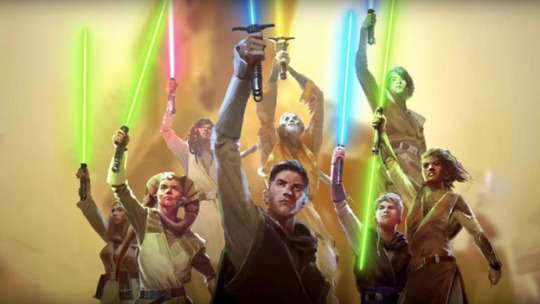
The High Republic is an giant multi-media project being carried out by the Lucasfilm story group to create a brand new era of Star Wars canon. It is set a few hundred years before the prequel era (so, a long time after the Old Republic era), in a period of peace and stability within the Republic. It currently includes several English language adult novels, a YA novel, two serialized comics, a manga, some short stories, and some short video blurbs published on facebook and youtube. A TV show for Disney+ has also been announced, but is a few years off. This project is unique in Star Wars, in that all of the different parts are being written together by one writing team, and are coordinated to tell a cohesive story. Also, what has been announced is just the beginning – they have stated that there will be three different sections of the High Republic, and everything we have had announced so far is just part one. As a note: this is an era for which there was NO pre-existing canon in Legends, so it is totally new territory.
OKAY, THAT’S NICE, BUT WHY SHOULD I BOTHER TO CHECK IT OUT?
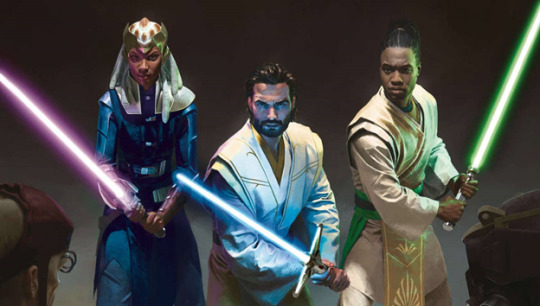
There are SO many reasons why the High Republic is worth your time to explore. I will try to outline some of them here below the cut (without any significant spoilers).
IT IS A LOVE LETTER TO THE JEDI
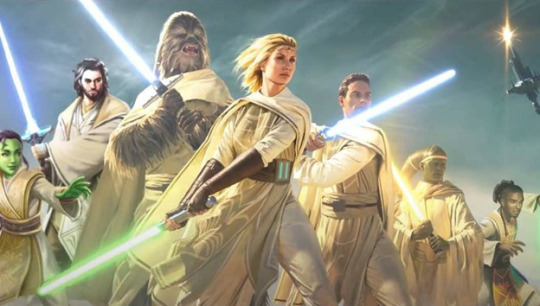
This is the era for everyone who loves the Jedi and wants to understand how they got to the point they did in the prequel era. It shows Jedi at their best: saving people, working together, being completely in tune with the Force (in so many beautiful and original ways), demonstrating creativity and flexibility and being rewarded for it, actually thinking through the ethics of things like the mind trick, and DEALING with their emotions rather than repressing them. It shows us how the rigid Jedi culture was saw in the prequels was a corruption of something that was originally healthy and uplifting. Jedi in this era are allowed to be flawed, and to grow, and have a community that supports them in doing so. This is the Jedi culture so many of us created as fix it fic for the prequel era, but made canon.
IT IS AN ERA OF HOPE
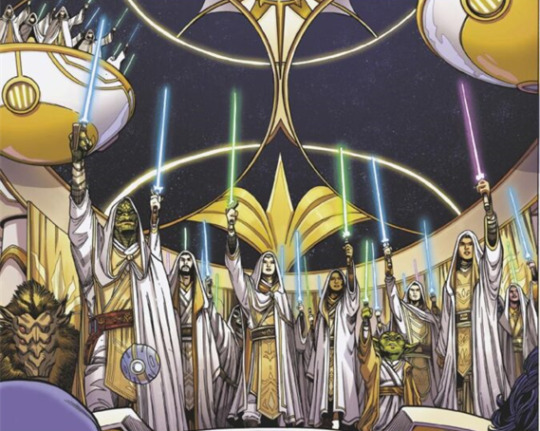
There are some serious problems in the High Republic Era. Without spoilers, the era opens with a terrible humanitarian crisis, laid over the Republic equivalent of the New Deal from US history. We see a lot of examples of people doing their best to be good to each other, and working for a more just and kind galaxy. They acknowledge that things are not perfect, but people from many different backgrounds (Jedi, politicians, farmers, pilots, business people) work together to try and make things better. I don’t know about you all, but with the darkness we see in the world today, I NEED some of that optimism in my escapist media. The High Republic provides that.
IT WILL GIVE YOU FEELINGS
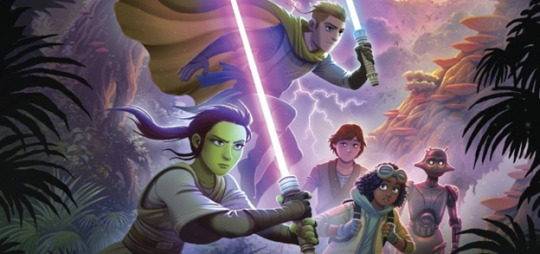
The existing material so far is structured to really let you emotionally invest in the characters and their struggles. Unlike with many eras of Star Wars canon, characterization is not sacrificed for the sake of plot (though never fear, there is PLENTY of plot). That means there is huge scope for empathy. I’m not going to lie; I cried within the first three chapters of Light of the Jedi, as did several other people I know. It is POIGNANT in a way that feels truly genuine.
IT IS FUN
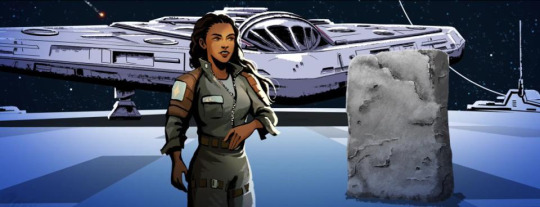
The writing team understands that, in the end, Star Wars is space fantasy. If your space fantasy is nothing but serious, gritty grimdark, it becomes pretentious and unbearable. So, for all that there is some heavy content in the High Republic (VERY heavy content – the Nihil should really have their own content warning), it has many moments of levity that keep it from taking itself too seriously. For example, the High Republic made Jedi bodice rippers canon. Also, characters like Geode exist (yes, that rock there is a CHARACTER). The result is something which honors the spirit of Star Wars, and keeps you engaged without being tedious or ridiculously depressing.
THE WRITING TEAM HAS DIVERSE PERSPECTIVES
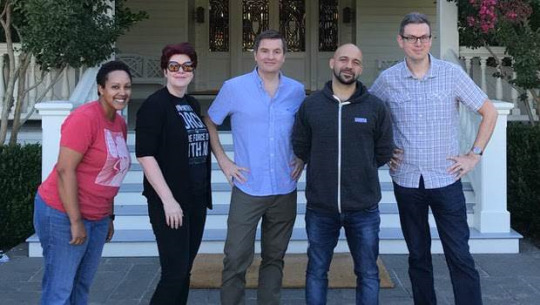
The main writing team consists of five people: Justina Ireland, Claudia Gray, Charles Soule, Daniel José Older, and Cavan Scott. You will note that includes two people of color, two women, and one out Queer person (in fact, one of the writers is all three of those things). This is a far cry from the white-cis-straight-man-dominated writing teams we have seen in the past. And when they bring in other people to the project, they make a point of looking for perspectives that aren’t represented on their team – for example, the manga is being co-written between Justina Ireland and Japanese writer Shima Shinya, and Ireland has stated in interviews that Shinya is taking the lead on the writing.
IT VALUES MEANINGFUL REPRESENTATION
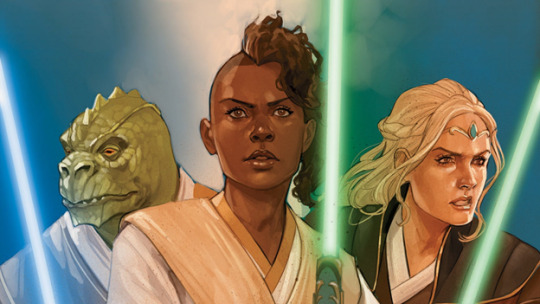
That diverse writing team means a cast that looks WAY more like the real world than any other era of Star Wars we’ve seen, in terms of representation. There are multiple characters of color, who are both heroes and central to the story. There are at least five canonical queer characters to date (a MLM couple, an Ace character, and two NB character). [EDIT: Thank you @legok9 for letting me know about the NB characters]. Among binary gendered characters, there is a very even balance of men and women. The writing team has also stated that they will be incorporating more representation of disability in the works to come. And the story is so much better for it – representation is included here BECAUSE it makes for more creative, believable, and original storytelling.
IT IS ACCESSIBLE
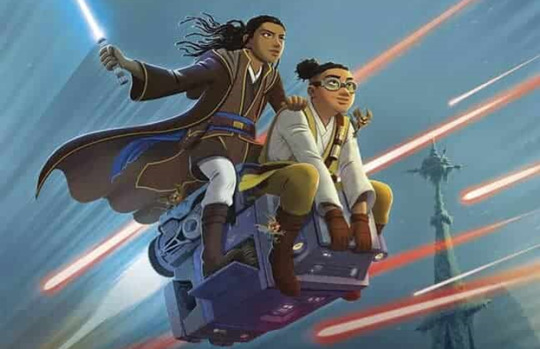
Because of the multiple formats, and the fact that it doesn’t rely on you knowing any prior lore, the High Republic offers many avenues to engage for people with all kinds of needs. Know nothing about Star Wars canon and feel intimidated about catching up? The canon is all new in this era anyway, so you’re fine. Can’t handle flashing lights? No problem – the little bit of video content that exists is totally free from the strobing effects that caused seizure and sensory issues. Need purely audio content? You can still have a full experience of the High Republic with the gorgeously sound-scaped audiobooks. Don’t have the attention span for books or long movies? Then the comics are your friend.
THERE IS SOMETHING FOR ALL
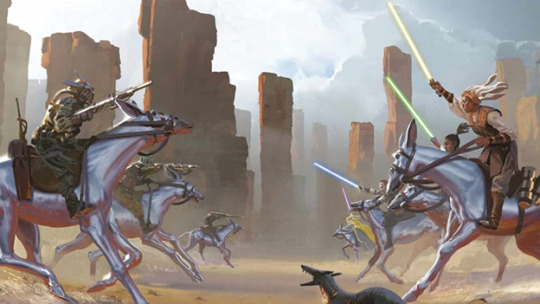
Between the books aimed towards adults and teens (and their respective audiobooks), the kids books, the comics, the manga, the short stories, AND the eventual TV show on Disney+, there is going to be content in the High Republic that suits most audiences. And that is just what has been announced so far – there is still more to come for phases II and III. This isn’t Star Wars written towards one group or demographic – it is Star Wars for everyone.
DID I MENTION THE FANCY JEDI UNIFORMS?
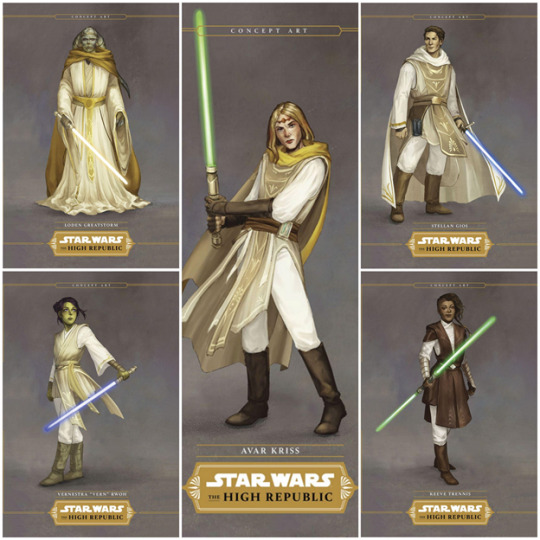
Because cosplayers and fanartists? This is the era for you. We are getting Jedi in silks with elaborate gold embroidery. Jedi with jewelry other decorative elements. Even the practical field uniforms have tooled and embossed leather. If you want to draw or make Jedi that have some of that that sweet LoTR-esque high fantasy aesthetic, the High Republic has your back. (Not going to lie – I am ALREADY imagining the time travel AUs. Put Obi-Wan in fancy clothes!)
OKAY, YOU’VE SOLD ME. WHERE SHOULD I START?
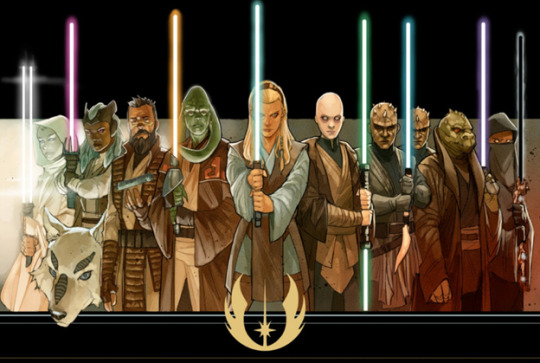
I strongly recommend everyone looking to get into the High Republic (who is old enough to be on Tumblr) start with Light of the Jedi by Charles Soule. I alternated between the physical book and the audio book, and found it delightful in both formats. After that, you have a lot of options. You can read or listen to the audio book of the YA novel A Test of Courage by Justina Ireland. You can check out the currently running Star Wars: The High Republic comic from Marvel, or the Star Wars: The High Republic Adventures comic from IDW. Or you can skip straight to Into the Dark by Claudia Gray. Honestly, there is no wrong order to try out most of the High Republic.
IN CONLUSION

The High Republic is Star Wars written for people who DON’T want Star Wars to be a good ‘ol boys club for salty white dudes who don’t want to see anything but more of Luke Skywalker. It offers broad representation, and optimistic narrative, and whole bunch of awesome Jedi content. If you are someone who fell in love with Jedi in the prequel era, the High Republic will give you more of what you loved. And if you are totally new to Star Wars? The High Republic is here for you too.
So, go check it. And then go write fic for it (please, there are only, like, 14 fics on AO3, I am dying).
#star wars#the high republic#jedi#long post#recs#book recs#representation#seriously I cannot recommend this highly enough#everything about the high republic is so very tailored to what I love about star wars in general and Jedi specifically#also...sorry I had been absent here#I swear I still love you all#I just have limited interaction spoons these days and spend most of them on costuming stuff
143 notes
·
View notes
Note
ive always been confused about something though. as absolutely horrible katsuki's behaviour was in chapter 1, is the core of his words ever really disproved by the series?
his delivery is atrocious and vile but like he's not wrong. a strong quirk will give you a huge advantage (and of course it depends on the person, someone like kaminari has a very strong quirk but didn't start out dedicated in improving it so he was wasting his potential, while someone like mirio has a very high risk high reward quirk that he made op solely due to to his perseverance. quirks can be used in creative ways. but they do need to have some sort of potential. look at ojiro, whose quirk is basically just an extra limb. it's cool and all, but when people around him can move faster than cars and float people to space and cause the earth to shatter from their heartbeat, it's pretty clear it won't let him keep up all that well) going on potential alone. it's not like katsuki relied solely on talent either, considering he studies hard enough to be a top three student in the best high school in japan and had at least some prior experience with fighting, + very fine control of his quirk. katsuki's mentality of talent + hard work = victory, is by itself, a very grounded and realistic worldview. in katsuki's eyes, izuku not only lacked a talent (re:quirk) but he wasn't working hard either. he was basically living in delusion. he wasn't even doing any type of physical training at all, despite knowing UA had a practical exam (he wasn't even giving himself a chance to pass that one).
(this strikes me as strange because you'd think someone logical like izuku would realise that he needed to train his body alongside his mind if he wanted a chance. maybe it circles back to the fact that izuku didn't just care about saving people, he cared about saving people in one very specific all might like way, and if he wasn't gonna have that very specific way, there was no use in doing anything at all. and that circles back to one of the biggest flaws of hero society i.e. that you can only be a hero in one very specific all might like way and anything lesser is worthless)
Self-sacrifice is a part of being a hero, but self sacrifice without power to back it up is just recklessness. And while Izuku's other middle school classmates are laughing at him, Katsuki takes him and only him very seriously and actively discourages him (in the worst way possible damnit katsuki i want to beat your ass so bad) from doing something he sees as reckless and delusional.
what i'm trying to say here is that, while izuku's powerlessness and delusion never ever made getting bullied his fault nor made him deserving of any of it, the fact that he was powerless and delusional is just that, a fact. it's the truth.
and then he didn't just get a simple flashy quirk, he got the flashiest of flashy quirks. so what's the message we are sending here with that particular, that you can live your dreams only if you get lucky enough and through a chain of coincidences the fairy comes to bestow upon you the exact magical talent you needed? that the world is unfair but if you become one of the blessed ones you can make it?
izuku's underdog status was converted to chosen one very early on in the series, but i do have trouble understanding what the overall lesson of his arc and the show is supposed to be, aside from power is what you make it.
I sympathize with a lot of the sentiments you expressed, and I also do feel like the messages in Deku’s arc are pretty confusing.
I think overall the story seems to have this idea that ideals without power to back it up are not much, but power without ideals can spin out of control.
But at the same time, it also seems to suggest that an everyday person could have been a hero to someone like Tenko by simply reaching out with kindness, and that was the type of heroism that quirkless Izuku represented (but nobody, including himself didn’t hold in high enough regard, except All Might).
The unfairness idea I think mimics the world. Deku being born powerless compared to Bakugou was unfair. Deku getting a power the frogleaps over everyone and makes people like Ojirou seem completely useless in comparison also seems unfair. But at the end of the day, the unfairness derives from the system that measures heroes my case resolution rate, and thus devalues heroes who “only” manage to save one person vs thousands, which comes down to measuring human life as a commodity. I think the point in Eri’s and Tenko’s arcs is to show that each life in its own way is an immeasurable potential.
I think as long as the story concludes in a way that shows that the powerless, the students with weaker quirks, pedestrian heroes all have their valuable place, can all make an impact, it can still be satisfying.
But what feels disingenuous to me at this point is for the narrative to still use Deku as the ultimate representative of the “powerless”. Because he’s not. We left that stage behind in Chapter 2 and his journey feels more like a “be careful what you wish for” and how a rosy dream can turn into a very dark burden.
There have been many things I disliked about Deku’s arc lately - the multiple quirks, this last pivot to “he’s been the only possible choice ever because quirkless is the ultimate superpower”, etc. - because I feel like how the narrative tries to keep elevate him into some kind of ultimate savior messiah - which reinforces the first message about heroes being made from the meeting of ideals and power - while neglecting the second message about the importance and impact of everyday heroes.
88 notes
·
View notes
Text
Teyvat, the twins, and the Archons: a theory
Hello today I will be explaining my genshin impact theory which is most likely right because I say so and I have an inflated ego
Note: I will be referring to the MC as traveler and the Leader of the Abyss Order as such or as the missing twin for neutrality’s sake. And also because I chose Lumine and I can’t bear to say Lumine is “evil”
Note after writing all of that: Actually, I’m wrong. Reading it made me realize how batshit off the rails it all sounds. But here it is anyways because it’s a funny theory.
Contains multiple spoilers for the entirety of the game (1.3 edition)
Part 1. Gnosticism, Archons, and Humanity
I think by now, most of us have heard of the Gnosticism theory. If you haven't heard of it, Gnosticism is the belief that humanity could be more than what we are at present because of the world we're in.
Gnosticism has many versions but the basic concept of it is that humans are stuck in a fake world where our full potential is locked away because of our belief in false gods. The true God is the creator of the true world and between us and him, are beings called Aeons. One Aeon who is called Sophia (meaning Wisdom) created a being who thought of himself as the One True God and created the physical world in his flawed image. Oh, and he gave seven beings rule over the world he created, who are called the Archons.
Under Gnosticism, humans are thought to be part physical, but also have a spiritual component in us that grants us divinity. But because the false god and archons actively work to make sure we never realize that there is divinity within us, we never reach our full potential.
Connecting this with genshin impact, the humans in Teyvat have access to visions that give them power, as well as a chance to attain godhood. However, they believe that it is a gift from Celestia instead of a thing any of them can attain themselves. In fact, they don't even know that if one "receives" a vision, they can become gods because it's a secret that only Archons are privy to. Venti says this himself at the end of the prologue section of the main storyline when we ask him about visions.
It seems like Celestia doesn’t want humans to ascend to godhood. If we pair this with what we know from the Main Storyline trailer that Dainsleif narrates, it becomes clearer. He says that Celestia goads humans with their seven treasures, rewards for the worthy, the doorway to divinity. However, it seems like there is a warning for those who dare to try and ascend, as if they say that the throne in the sky is not for us even if we have the means to.
Doesn’t that seem to contradict the purpose of the vision? Yes, it is a means to help humans live in Teyvat, but why give out visions when the Archons know fully well that it could help them gain access to Celestia? Doesn't it then seem like visions are not gifts from the Archons but instead innate power that all humans possess?
Part 2. What are the twins + What is Dainsleif + What are they doing in Teyvat + the Genesis Pearl = A Loop
Most signs point to the idea that the twins are actually older than they look. It seems like Lumine and Aether landed in Teyvat at least 500 years ago during the cataclysmic event that wiped out Khaenri’ah.
Going back to the idea of Gnosticism, the true God sends out Messengers of Light to the false world to guide the humans to their full potential. And we see traveler helping their companions ascend further, reaching their fullest potentials when they “max out.”
Furthermore, it doesn’t seem like they’re human. During the 1.2 Dragonspine event, Albedo does tests on us, and though he doesn’t tell us his complete findings, he alludes that we are like him, created from a substance that is yet to be defined. This goes off from the theory that he’s a homunculus, created from chalk, purified soil, the building block of the world. Aside from that, after our fight with Childe, one of the dialogue options after he mentions the fact that traveler can use both anemo and geo, is that they’re slowly gaining back their true power.
And of course, when the twins first enter the world, they have actual wings which were stripped by the Unknown God. Doesn’t seem very human to me.
So, if the travelers are Messengers of Light, then why is that not their main goal? Based on the We Will Be Reunited trailer, when the Abyss Mage mentions the traveler to the missing twin, their face looks shocked, like they just remembered that they have a twin. There’s desperation in their steps when they rush to the cliff to see their twin again, like it’s been so long since they’ve seen their sibling who they literally forgot. I think that aside from stripping them of their power, the Unknown God also took away some of their memories.
So the missing twin might remember the actual purpose as to why they’re in Teyvat, but didn’t remember their sibling until recently, and traveler remembers their sibling but doesn’t remember the reason why they were in Teyvat in the first place (or they do but that isn’t their main concern since they’re putting their sibling first).
So how does Dainsleif relates to this particular segment? Well, in another version of Gnosticism, Aeons come in pairs. Sophia’s partner was Jesus. Now, in the Main Storyline trailer, Dainsleif alludes to a woman when at the very end of the video where he says “My memory has all but faded completely, but I will always remember, how she too loved these flowers.” The flowers are the flowers Lumine especially likes, the ones she adorns in her hair. A flimsy connection it may be, but a connection nonetheless.
Now, I’ve seen theories about Dainsleif being an older version of Aether, but that theory doesn’t hold water if you choose Lumine as your traveler or if you consider the fact that Dainsleif and Aether don’t share the same eye color. Yet, it’s not completely off. There are thirty Aeons in total, although this number can differ in other versions of Gnosticism.
Now, in Dainsleif’s quest, we immediately question this stranger as he is somehow omniscient, if we haven’t already questioned him with all his narration in the Collected Miscellany videos where he hints that he knows more than we do. I will say it now: I think that Dainsleif takes upon the role of Jesus.
I could be wrong. But I think I’m right. For now.
In another version of Gnosticism, Jesus goes to the false world and saves Sophia, as she forgets who she is, she forgets her divinity and is stuck there. If we follow the theory that Dainsleif is actually the second heir from the Gnostic Chorus teaser, and that he is searching for the Genesis Pearl. The Genesis Pearl symbolizes the beginning and purity that is incorruptible. This could be the essence of Sophia, the lost Aeon who incidentally created the false god.
Back to the Main Storyline trailer, Dainsleif says that the war has already begun, and that is just a continuation of past battles. We could take this in a sense that the conflict has reached its boiling point and that it was only because all these problems were left alone for too long. However, we could also consider the possibility that Dainsleif has lived through whatever the twins are going through right now because he is the first Messenger of Light to step foot in Teyvat.
We can also look into Dainsleif’s name, which is a Nordic name, actually written as Dáinsleif. This means Dain’s Legacy which is the sword of King Högni, which aided him in a never ending battle that went on until Ragnarok.
It seems like the twins are repeating a cycle that has already happened to Dainsleif and whoever the unknown woman who also likes the flowers the missing twin likes. All four of them are Aeons or Messengers of Light.
So who is that woman? I have no idea. It could the unknown god but that feels like a stretch. The unknown god might actually be the demiurge, the false god that created Teyvat and the seven Archons, and not Sophia herself. It could also be Paimon who might have some kind of relation to the unknown god, whether it be that she is the unknown god, or she is a being from Celestia. Either way, both feel like shaky theories.
But of course, Mihoyo is only taking inspiration from Gnosticism and several other sources which could lead them to take creative liberties when applying it to the game.
Part 3. The Abyss Order and Khaenri'ah: war crimes against humanity
Going back to my point about the twins’ original goal to why they went to Teyvat in the first place, let’s question why the missing twin joined forces with the Abyss Order and began to lead them to burn the throne of Celestia.
While we don't hear the missing twin mention Celestia in the We Will Be Reunited trailer, the only other time a throne is mentioned is in the Main Storyline trailer when Dainsleif mentions that Celestia does not want humans to ascend to take up a throne in the sky.
Back to the safety of the game's actual lore, we understand that Kaenri'ah is a godless nation that might have underwent a calamity that might have killed off most of its people since they were closer to understanding the truth, and were technologically advanced, compared to the other nations of Teyvat. An alchemist named Gold ultimately led to this cataclysm due to their greed for seeking erudition.
It is safe to assume that Celestia wiped out Khaenri'ah and all the technology they created. We could also assume that the people were all killed, yes, but it would be better to assume they were cursed instead. Into what though?
The hilichurls.
In the archive section of the game, under the books, there's quite a lot written about the hilichurls, thanks to Jacob Musk. The author describes the hilichurls to be drawn to old relics of the past, with even attempts to recreate it. Their way of lifestyle is even described, and it looks like they worship the element itself and not the Archons who represent it.
Doesn't it seem like the hilichurls have a connection with the ancient civilization of the past? Not to mention their strange connection to the elements in which shaman hilichurls (samachurls) can harness the elements without the use of a vision? If I am correct with my theory, then hilichurls were once citizens of the bygone Khaenri'ah who discovered they could harness the elements without an Archon's blessing that came in the form of a vision.
It doesn't feel too surprising considering that for monsters, hilichurls are quite smart. They even display human-like characteristics. In the game, we see them dancing, sleeping, just minding their own business in general. They have their own architecture and their own language. In the Hilichurl Cultural Customs book, we even discover that hilichurls are not as barbaric as they are made out to be as they have leaders who decide their policies and course of action. It's as if they have their own culture.
Ultimately, the hilichurls are part of the Abyss Order. The organization's main goal is to get undermine Celestia's rule, and at this point of this mess I call a theory, doesn't that make them stand in a position where nothing is painted as black and white as it seems. Yes, they do heinous things like steal, possibly murder, and set off a dragon on Mondstadt, but it looks like they're operating through a "the end justifies the means" kind of morality.
And the missing twin shares this sentiment. As they had seen what Celestia had done to Khaenriah 500 years ago before the beginning of the prologue, their desperation grows. Their war with destiny will not stop until Celestia falls because it is their ultimate mission. Traveler has taken up the safer side of this war, wherein they help the humans but the missing twin has taken up the side of fallen humans. This is why they're not evil per se; just going through questionable steps to achieve a righteous goal.
Part 4. Teyvat and its Archons
Based on all that, it seems like I’m painting the Archons to be the bad guys. I am. They wiped out an entire civilization on the basis that they might learn the truth of the world, and their uncanny closeness to Celestia.
But we like Venti and Zhongli, right? Of course we do! However, they were still complicit in the downfall of Khaenri'ah and the limitation of humanity in Teyvat.
To start, Venti had his gnosis was forcibly taken from him. He doesn't seem to mourn over that (although he could be hiding it) and it looks like he can still present himself in a godly manner as we see in Venti's quest when he revealed himself as Barbatos to Stanley. When we spend time with him under the tree of Vennessa, while he divulges the secrets of Celestia to us, he still seems to comply with them. This could be chalked up to the fact that ultimately, he is Mondstadt's Archon and also the weakest of the seven. We could also consider the fact that at the time of Khaneri’ah’s downfall, he was in Dragonspine with Dvalin, dealing with Durin.
With Zhongli, it becomes a bit more interesting. He gave away his gnosis under the agreement of a contract we do not know the details of. But why he did? Why not because of his regret as the geo Archon and of love? Zhongli once ruled over Guili Plains with another god named Guizhong, the god of dust. Guizhong loved their people but perished during the Archon War. He then moved their people to Liyue Harbor and in her place, began to love them. Although he is stilted with the way he deals with his people, we see that he cares. Over the years, he has grown soft and shed the persona of Morax, a god who dealt with war. He says this himself and it feels like his ability to care extends beyond that of Liyue. It's possible he gave up his gnosis because he understands what the Tsaritsa is doing and what she's fighting for.
The Tsaritsa is the cryo Archon and the god of love. However, according to Tartaglia, she had to harden herself to go through with her plan. But what is her plan but an act of love for humanity? Wiping out Khaenri'ah could've opened her eyes to the inherent cruelty of Celestia. The timeline makes sense because Venti said that 500 yers ago, he knew her well but now, not so much. It’s at that point she loses whatever loyalty she had for Celestia. She had to steel herself and begin her plans to overthrow Celestia, which involves taking the gnoses of the six other Archons to fight the false god and alleviate humans from the hell they are in. That is her way of showing her love to humanity.
Teyvat is only a false world. We have seen many instances of this being hinted at like when Katheryne of the Adventurer’s Guild says “rebooting” or “error” as if she is only a program, or when Scaramouche says that the sky and the stars are all fake. Even in the game, if you take a closer look at the stars, it feels fake, as if it is a dome that traps the humans in Teyvat. Even more unsettling, when going deeper within the Spiral Abyss, the more stars you see which could mean Teyvat is actually upside down and that go deeper within the Spiral Abyss, we are ascending closer to the true world.
What greater act of love could the Tsaritsa commit other than giving humanity the truth?
Part 5. In conclusion: none of this makes sense
To summarize my main points:
Genshin Impact takes a lot from the mythos of Gnosticism
Visions are not gifts from the Archons but an inherent power from humans that come from their own "divinity"
The twins and Dainsleif are related in some manner
The twins are repeating a cycle that Dainsleif has already been through
The twins are suffering some kind of memory loss
The twins are in Teyvat to help humans realize their power
Celestia is not heaven but more like hell
Teyvat is a false world
The Tsarita is actually good
The Abyss Order is a morally grey organization
Archons are bad
This could all be wrong as this is only a theory. But the connections I pointed out make a bit of sense. There’s still more lore to uncover as we’ve only unlocked two regions and the Pale Princess and the Six Pygmies only have one volume out so far (this book is important because an Abyss Mage says that there is a lie within it) so this could all be debunked when new regions are unlocked.
Still, it’s a pretty fun theory to believe in at the moment. Thank you for reading this mess I call a theory!
#genshin impact#genshin impact theory#lumine#aether#dainsleif#venti#zhongli#and when im wrong ?#who cares this is a funny theory actually#if anyone wants to discuss this theory ahaha my dms r open#also if i have made any mistakes pls tell me LMAO#take shot whenever i say gnosticism I HATE IT HERE MY BRAIN IS SO FRIED#i could write this more seriously but to keep myself from slipping im writing this what i call i can get away w comedy in my academic papers#bc its not funny#just me barely holding onto the tendrils of my sanity#yes i linked a wikipedia page LET ME BE I DONT WANT TO EXPLAIN RAGNAROK ANYMORE#wont mention battle pass anymore for dainsleif its too long lmao
115 notes
·
View notes
Text
Van Zieks - the Examination, Part 1
Warnings: SPOILERS for The Great Ace Attorney: Chronicles. Additional warning for racist sentiments uttered by fictional characters (and screencaps to show these sentiments).
Disclaimer: These posts are not meant to be taken as fact. Everything I'm outlining stems from my own views and experiences. I am a 30-something European woman, and therefore may not view the matter from certain angles. That said, I'm always open to more input from others. If you believe that I've missed or misinterpreted something, please let me know so I can edit the post accordingly. If we can make this a team effort, I would love that.
The purpose of these posts is an analysis, nothing more. Please do not come into these posts expecting me to either defend Barok van Zieks from haters, nor expecting me to encourage the hatred. I am of the firm belief that characters are no more than a tool created to serve a narrative purpose, therefore the question I'm posing is whether or not Barok van Zieks serves this purpose. That's all I'm doing here.
I'm using the Western release of The Great Ace Attorney Chronicles for these posts, but may refer to the original Japanese dialogue of Dai Gyakuten Saiban if needed to compare what's said. This also means I’m using the localized names and localized romanization of the names to stay consistent.
It doesn't matter one bit to me whether you like Barok van Zieks or dislike him. He's not real anyway, so he can't suffer from it. However, I will ask that everyone who comments refrains from attacking real, actual people. If you know you're morally in the right, there should be no need for insults to begin with. Let's keep this conversation civil and constructive!
As the first post in a series, let’s first start by examining the expectations we would have for a character like this. The purpose he was meant to serve.
1: Expectations
As I said in a different Barok-related essay, the main prosecutor of any Ace Attorney game has been, and always will be, an antagonistic force. Not a villain, not even necessarily someone who exhibits immoral traits. (Hi Klavier!) Just someone who impedes the protag’s goal of getting a not-guilty verdict. In order to have an effective antagonist, they need to mirror the protag's weaknesses back at them. Ace Attorney does this quite well, as the prosecutors represent the obstacle/turmoil that the defense needs to overcome. Often times, the prosecutor is also tied to a pivotal moment in the attorney's past, making sure the strife is quite personal.
Considering the game's plot and settings, it would've been difficult for Barok to be tied to Ryunosuke's past. (He is tied to Asogi's past, funnily enough, but that's a matter I also addressed in that other Barok essay.) So instead, Barok represents Ryunosuke's struggle in more of a figurehead capacity. I've seen people dub him the 'CEO of Racism', and I'm not gonna lie, in a way that's correct. Barok was designed to be the mouthpiece of the harmful sentiments Japanese exchange students would have encountered in the 1900s. By extension, since Ryunosuke is an exchange student unfamiliar with the British courts (or even courts in general), the prosecutor would target the fact that Ryunosuke 'does not understand how things are done here'. Which he does- a lot. This makes it all the more satisfying when Ryunosuke proves him wrong by outsmarting him and using Britain's own laws (such as the closing argument) against him. So yes, you may hate Barok for uttering racist sentiments and dismissing Ryunosuke's abilities, but the ultimate goal here is that Barok's defeat is made sweeter as a result. The narrative end-game is Ryunosuke's triumph and validation in the courtroom.
Was there a different personal struggle Barok could have represented? Yes, but also no. Sure, his vendetta could have been strictly with the Asogi family and Ryunosuke could have admitted to carrying Asogi's resolve, not knowing what it meant. Though that would’ve implied very early that Asogi had a history of sorts in Britain and would’ve destroyed some of the surprise we experience in game 2. Alternatively, there was also the 'parallel' antagonist angle. The sort of villain who says the line “we're not so different, you and I.” The antagonist who shows what happens when someone with the same skills or motivations follows the wrong path, which emphasizes the right path for the protagonist. However, I can't see that working in the plot of this game.
A purposeful decision was made by the writers to have prejudice be a central theme of the plot. This is the matter that hits the hardest in an emotional sense. Therefore, having Barok be the centerpiece of this prejudice ensures he leaves the biggest narrative impact.
---
However, another long-running aspect of the AA prosecutor is the redemption arc, so let's turn our attention to that!
I'm not going to put too much effort into explaining this, I just want to talk about the requirements of a redemption arc. We all know these types of arcs, a lot of Ace Attorney prosecutors have them. We see them in fiction all over. Noteworthy examples of redemption arcs done well include Zuko from The Last Airbender, Michael from The Good Place... For argument's sake, let's toss Edgeworth in there too. I'm not saying Edgeworth's arc is done well, but at the very least it is accepted by most as something that served its intended purpose. I've never seen anyone question Edgeworth's transformation.
See, what we have here is a bit of a misnomer when it comes to what people expect to get out of these types of arcs. Redemption in itself is only 'deliverance from sin' or 'being saved from evil'. It's the thought that a horrible person can still see the error of their ways before it's 'too late'. However, when it comes to absorbing media, often a character gaining knowledge that they were in the wrong isn't enough to satisfy the audience. Would Edgeworth have had a satisfying redemption arc if he'd acknowledged his arrogance and dirty tactics, only to retire as a prosecutor? No way. We needed him to return in the following games to give us an update on his status. Standing in court as a defense attorney, at the risk of damaging his reputation, was the moment we knew he'd grown for the better.
What we require for the arc to come to a good conclusion is atonement. The character in question must not only apologize for their actions, but repent in a more active manner to show that they've changed their ways. Following that, the atonement must be acknowledged by others. So for example, Zuko joins the ATLA gang to help them in any way that he can until even the most skeptical of the group, Katara, acknowledges his transformation into a better person. Now add to this the notion that the character's atonement must be virtuous and sincere. The Good Place is a fascinating look into the debate of 'is it ever too late for a person to change?' and the moral complications of changing in the first place. If you're only doing good things because you want to be saved from damnation, are you being a good person or are you being selfish? There's such a thing as corrupt motivation; only doing good because it is expected. For example, does sponsoring a library make Magnus McGilded a good person? It does not, since he's only doing it to boost his own reputation and have people believe he's selfless.
As a final note, I want to ask: Does a redemption arc require a backstory to justify the character's immoral ways? Personally, I don't think that it does. It's good to have, since it allows an audience to empathize with the character and give them more of a reason to root for them. It turns the redemption arc into a tale about overcoming past trauma. However, it can backfire when done badly and lead to frustration. (I'm looking at you, live action Disney movies!) Some characters are evil just for the sake of being evil and even then, they can turn over a new leaf because they realize it is just so much more rewarding to be good. Just look at Michael from The Good Place.
What's more effective than a backstory, in my opinion, is smaller details to humanize a character. Humanization can also lead to empathy, perhaps even relatability, and helps us believe that they're capable of change. We need to be told that a character has their own fears, their own flaws, their own odd little habits which deviate from the norm... Again, I'll point to Michael from The Good Place for this. Another humanization tactic, which we see employed often in Ace Attorney, is to display a prosecutor's likes and hobbies outside the courtroom. Edgeworth's fanboying over the Steel Samurai, Blackquill's love for birds, Nahyuta's willingness to stand in line for hours to get his hands on a delicious burger... I've feel ya, Nahyuta. This tactic is more readily employed in Ace Attorney because it's difficult to place a prosecutor in a position of weakness before the final showdown. You can show them tending to hobbies during Investigation segments, but you can't show them waking up from a nightmare or wondering whether their father loves them. Well, not until case 5 of that game, anyway. By then, it's too late to serve as the sole humanization factor.
Did Van Zieks need to be redeemed at all? The way I see it, the only correct answer is yes. What do we want to see in our world? Do we want people who hold racist prejudice to acknowledge their faults and become better, or do we want them to die clinging to their shitty moral compass? Do we want a world where everyone learns to get along, or do we want a world where people continue to be in the wrong and act like assholes until they inevitably get punished by law for something or another? Van Zieks needed to be redeemed in order to teach that valuable lesson that it’s never too late to be a good person and that it pays to be a good person.
So to summarize, what we needed from Barok van Zieks was the following:
1) Present an antagonistic (possibly immoral) force who personifies Ryunosuke's biggest personal obstacle/weakness, in this case racial prejudice.
2) Humanizing traits begin to show.
OPTIONAL: A backstory to justify any immorality he has.
3) Over time, Barok has his realization and sees the error of his ways.
4) Barok atones for his immorality, not simply through apology but by taking decisive steps.
5) The cast around him acknowledges his efforts and forgives him.
This leaves us with the question: Does the game deliver on these points? Well, let's boot it up and find out! Stay tuned for The Adventure of the Runaway Room! (as a warning, it’s gonna be LONG)
#dgs#dgs spoilers#tgaa#tgaa spoilers#barok van zieks#oh god here we go#i actually already finished Runaway Room but I need to let it sink in#it was a doozy
49 notes
·
View notes
Text
Pre-Season 6 Thoughts - In Conclusion, Fuck the CW
okay yet another supergirl post bc I want to say some things before s6 starts airing
I started watching this show in middle school. I was just starting to become confident about the fact that I liked girls and as a girl I was really excited to watch a show about a female superhero whose most important relationship was with her sister. I thought Cat was hilarious, and I about lost my mind of happiness when Alex came out.
Season two rolled around and I absolutely fell in love with Lena. Again, I was really excited at the prospect of this super complex, female character. Pretty soon I hopped onto the supercorp train and never looked back.
Genuinely, I really, really loved this show. I loved Maggie and Sam and Ruby and Lucy Lane and Cat Grant, I adored Winn, thought J'honn was an absolute bop of a character. I thought there were really interesting and intriguing storylines, like Lena's short and emotional stint experimenting with humans. In hindsight, I even think that the idea of Mon-El could have been really compelling, even if it wasn't executed extremely well.
All this to say, I have had a lot of love for Supergirl. It's sentimentally valuable to me, and I feel so nostalgic when interacting with supergirl art on Tumblr or reading supergirl fanfiction or just watching it in general.
it's also incredibly, fundamentally, flawed.
please note that I don't blame actors for anything at all. there's obviously things that have happened behind the scenes, but I want to talk specifically about the show runners/writers/directors.
as a middle schooler, when I was 12, 13, even 14, I watched supergirl for the pretty people and focus on women and the aliens and (to middle school me) compelling plot lines.
however, this show has shown time and time again that they are incapable of focusing on platonic relationships between characters for extended periods of time. we got a few episodes of kara and nia working together and then an entire subplot focused on nia and brainy's relationship. as the show continued into its third and fourth and fifth season, danvers sisters moments became few and far between, which was especially distressing considering the show was originally built upon the strength of Kara and Alex's relationship.
James? became primarily a love interest for whoever the nearest woman was. and also a disastrous vigilante. sort of.
They brought Lex Luthor back, in a show that was supposed to be focused on the women of the superhero world, especially Lena, Lex's sister. For her to be pushed out of the Luthor spotlight in supergirl of all shows is discouraging, and it only builds upon the shitty rep the CW has given us in one of their only shows with a female lead.
Kara, of course, was inconsistently written, to the point where it's transparently obvious that the writers have her make decisions that are the most compelling for the sake of the plot rather than decisions that were the most in character for her to make.
Kara and Lena were established to be best friends. then, they were constantly pitted against each other, again, mostly for the sake of plot. supercorp aside, we can still talk about how Kara never told Lena about her identity until the fifth season, about how despite being "best friends" their relationship was hardly focused on. we instead saw the James and lena elements or lena and her science plot lines, but the gals themselves? hardly any scenes. this specific argument is strictly from a platonic kara/lena point of view, although I do ship them so I admit I'm biased.
Supercorp as an actual romantic ship is something I definitely have Opinions about, but I think that's for a separate post. HOWEVER, I do want to address the queerbaiting we've seen for years.
While I don't want to go too in depth (since this really is mostly for the supercorp post I'm also drafting 💀) but complicated story short, the very obvious queerbaiting regarding supercorp, as well as blatant encouragement of fans shipping the two together - liking comments regarding supercorp on their instagram, for example - is not only disrespectful and, to be frank, manipulative of their fanbase, but it also borders on (in my humble, seventeen-year-old opinion) unprofessionalism.
the supergirl social media accounts encourage behavior from their fans that they have proved time and time again they have no intention of actually rewarding in the show. maybe if this was the first or second year of supergirl airing, this wouldn't be a huge deal, but at this point, they know exactly what they're doing, and it genuinely makes me so angry.
I don't have high hopes for this last season. I'm looking forward to the more fan service-y episodes. Really, I'm only going to be watching it for the nostalgia factor, desire to see it through and get closure, and, if I'm being honest, clown-like hope that maybe, just maybe, they'll be able to fix the show that has grown more and more unstable over the past five years.
TL;DR: I loved supergirl as a kid, it holds a special place in my heart, but over the past few years, the writing and management of the show has made it one of the biggest disappointments I've witnessed amongst all the media I've been able to consume in live time (as opposed to things like ouat, which I only got into just as it was ending). While I'm going to watch the sixth season out of fragile hope and the desire for something akin to closure, it is going to take A LOT for supergirl to redeem itself.
happy final season, kids.
#supergirl#supercorp#kara danvers#Alex danvers#lena luthor#nia nal#brainy#James olsen#Katie mcgrath#Melissa benoist#Nicole maines#fuck the cw
48 notes
·
View notes
Text
The Unforgivable One
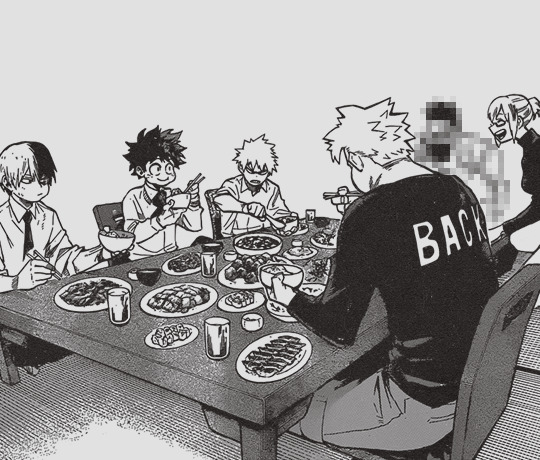
Someone in my inbox accused me of not treating the heroes like “flawed human beings”. However I think they had a fundamentaly misunderstanding of the way I read characters, both heroes and villains. I don’t see people as good or bad. I see everyone as equally human and flawed. Bad people don’t do bad things because they’re psychopaths, they often do these things for very understandable and human reasons. You can often hurt someone for very normal reasons. Abusers are in fact human too, and often they don’t really see themselves as bad people. Most people are not in fact cackling villains but in fact perfectly normal human beings going through mental gymnastics to justify themselves. So with that in mind let’s take a look at the incredibly flawed human being that is Todoroki Enji. Obvious content warning for discussion of child abuse under the readmore. If you can’t stomach it please don’t read this post for your own safety.
1. Endeavor’s Motivations

Endeavor’s motivations aren’t hard to understand, because they’re basically the same as Bakugo’s his foil. This is something the manga itself has commented upon. Bakugo gives us a view into the mindset of teen Endeavor and likely the attitude that led him to becoming the adult he is.
Endeavor is, in a way, as much of a victim of hero society as Bakugo is. In the fact that Enji has been negatively influenced by a lot of the views of hero society. Bakugo and Endeavor both have incredibly flashy quirks more suited to combat and defeating villains rather than saving people which makes them the ideal of hero society’s quirk prejudgice. People are not born equal, that’s the words that the manga start with, and it’s imporatnt to notice that people like Bakugo and Endeavor are heavily favored by hero society but that too comes with its own unique set of pressures. As hero society is ultimately a very toxic system overall that holds up an unhealthy ideal.
Bakugo is a bully, ultimately. He wants to make other people feel small to make himself feel big. Endeavor is the grown up version of that same bully. However, Bakugo while being a bully Bakugo also has an extremely uhealthy mindset where he is constantly piling up pressure on himself and never really feeling satisfied. A mindset which instead of trying to correct Hero society praises Bakugo for having, and encourages.
Let me explain. Basically, Bakugo and Endeavor are both the living embodiment of “damned by faint praise.” They are constantly being praised and told how special they are because of their quirks. However, while this may have been enough for them early on in their lives while they are little kids they eventually get the sense that they haven’t really earned the massive amounts of praise people give them.
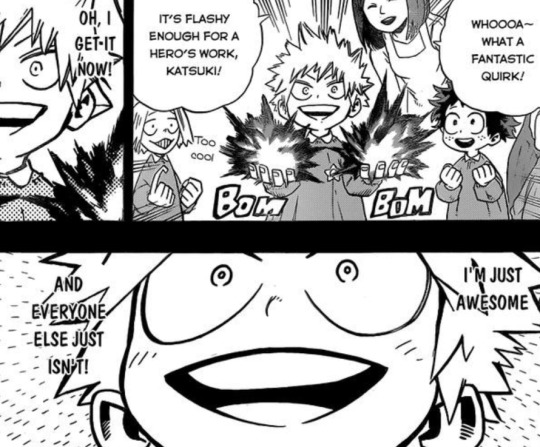
This causes both of them to be struck with a serious case of what most people call “Imposter’s Syndrome”, they don’t really feel like they’re the ones getting praised. They don’t feel like they’ve earned it. This is when one of their first mental traps springs. They decide they have to become the really great person that everyone sees them as. They’re always specifically aware of how short they fall as a hero from the expectations of everyone around them, and they are constantly working to make the difference up.
Endeavor and Bakugo are people who have incredible drive, and also an incredible motivation to improve themselves. This has been stated before by the story several times but none of these are bad traits to have. Wanting to improve yourself. Wanting to live up to everyone’s expectations of you, or even your own expectations of yourself can lead to you pushing yourself to do good things.
However, the problem is for both Bakugo and Endeavor that no matter how much they build themselves up in their head they’re building on very flimsy foundations. Both of them are building towers of sand, or houses of cards. They have a lot of self-confidence in themselves but it’s always fragile. Because they have confidence, but no security in themselves. They are extremely insecure individuals.
They both pile up an incredible amounts of stress and pressure on themselves to be the best, or at least to be as good as they think they should be, but they also both suffer from the two same critical flaws. Number one, they have been taught no healthy ways to deal with this negative buildup of stress. This is once again one of the faults of hero society, if people are strong then nobody around them will ever see them as week.
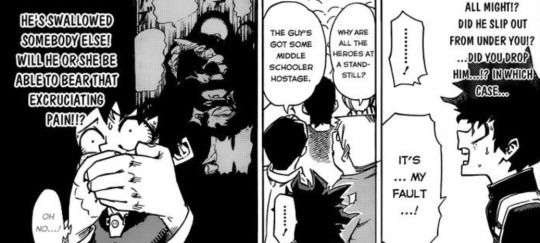
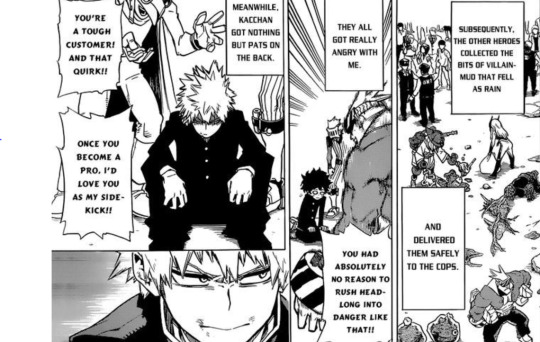
Bakugo is kidnapped by a villain at the start of the manga, not a single person is worried that he might be traumatized from nearly being killed. Of course not he has an incredibly powerful quirk. He’s strong, so he must not suffer from trauma like the weak kids.

Bakugo is uniquely pressured because he has a strong quirk, everyone around him expects him to be strong at all times and Bakugo himself does not allow himself to show any vulnerability. Bakugo legitimately believes that if he was strong enough, he would never fail, never lose. Bakugo basically doesn’t allow himself to be human in any of the ways that count. Bakugo only sees himself but that’s a double edged sword, when things go wrong the fault has to be with Bakugo, it’s because Bakugo was weak. So, Bakugo has been severely emotionally neglected by the institutions around him including UA, which after Bakugo has been kidnapped by several murderous villains did not think to check if a fifteen year old was traumatized and mentally healthy enough to return to classes.
The second flaw in their mindset is that they are continually forced to prove themselves. They work hard, but feel no satisfaction no matter what they accomplish. Even if they have the most resolved cases, even if they get number one in the tournament. This is because once again, the enormous pressure and expectations they push onto themselves. If a Straight A student gets A’s, it’s not extraordinary he’s merely doing what’s expected. If a C student gets an A that’s an accomplishment. Their expectations are so high for themselves that they can literally never be met, and therefore they feel no relief from the constant piling up of expectations and stress.

This is why Bakugo is fundamentally insecure. He’s not good enough to meet his own standards, and it seems like everyone else exists to prove how small he is. Bakugo sees the world as everyone else looking down on him because he’s so stuck in his own head. Bakugo cannot emotionally process this, and because of that at even the smallest upset he starts crying and acting like a child because he just can’t handle these emotions. He’s unstable, mentally always in a very precarious place.
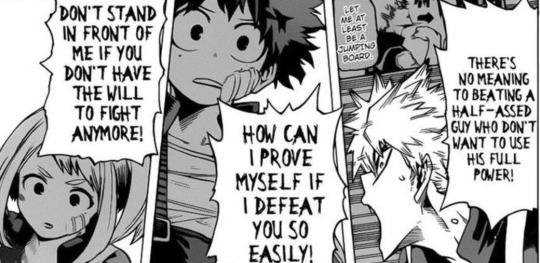
What Bakugo wants is to feel good about himself. He wants to feel like all his hard work is accomplishing something. However, Bakugo’s self esteem comes not from what he’s accomplished but rather that feeling of being better than others, the societal pressure to be the best, which is why he not only has to be the strongest but has to put others down below him. Not only that, but if he feels like somebody is disrespecting him or not taking him seriously then Bakugo even goes as far as to lash out violently. He literally tried to attack an unconscious Todoroki (who was holding back due ot having flashbacks of his father in the middle of a fight against Bakugo... hmm, i wonder why). Bakugo’s mindset is very insular. Bakugo just kind of assumes that everybody thinks exactly the same way he does, because he’s not emotionally intelligent really to understand other people. So he just assumes Todoroki holding back is an intentional insult against him and gets angry. In Bakugo’s mind it’s justifable to be violent against an unconscious Todoroki, because Todoroki’s the one intentionally provoking him and looking down on him.

Bakugo and Endeavor go through a similiar arc. They both build these giant towers on foundations of sand, only to watch them crumble and be left with nothing. They both realize that they were fighting for the wrong thing all this time.
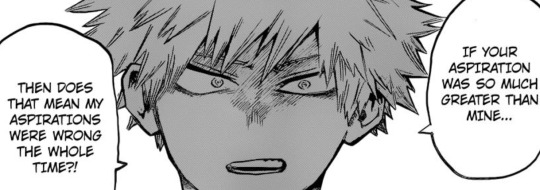
When they realize they were fighting for the wrong thing, all they can feel is emptiness and their own personal disatisfaction. Bakugo and Endeavor were chasing something they were never really going to have in the first place, because even if they became the number one hero, even if they were the strongest in the world it would never be enough for them. Which means they’ve accumulated all this stress but have no healthy way to deal with it so they vent it out. Literally the only thing Bakugo can think of to do when he’s at his limit is beat up Deku one more time and try to make himself feel strong again and prove that his way of doing things wasn’t wrong.
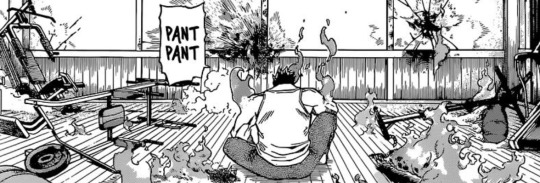
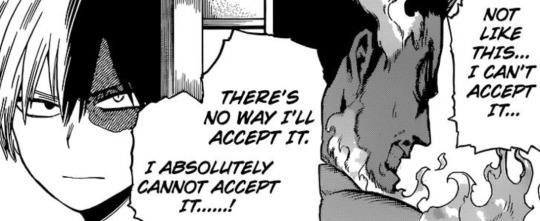
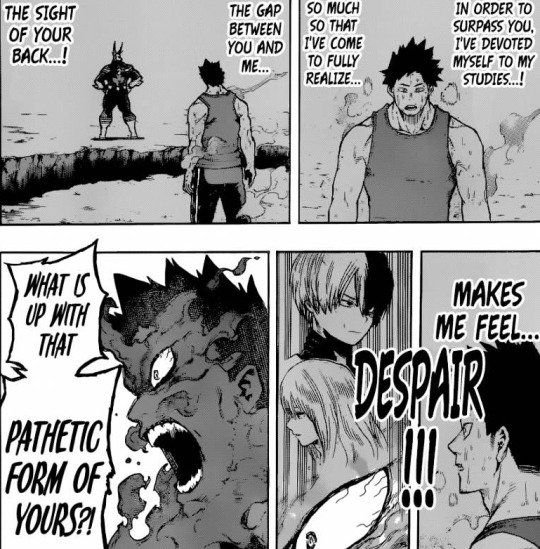
Bakugo and Endeavor find themselves at similiar points. They both realize everything they were devoting themselves for was wrong from the start, and they were never going to get what they wanted out of life. While Endeavor’s reasons are not necessarily sympathetic, they are at least understandable and human. Endeavor feels like he’s owed a reward for all of his hard work. He wants to feel like he’s someone special and important. Endeavor and Bakugo are selfish yes, but a selfish drive doesn’t have to be a bad thing necessarily. Endeavor and Bakugo are always pushing themselves to be the absolute best version of themselves because they believe in society’s pressure to be the best wholeheartedly. They’re also continually made to feel worse than everyone around them. Their tremendous egos are actually fueld by very small insecurities.
They also much like human beings don’t absolutely think they are right all the time. Bakugo and Endeavor both have hit their limits so to speak. Their struggles are sisyphian. They push the boulder up the hill, watch it roll down, push the boulder up the hill, watch it roll down and are slowly realizing that all of their struggles are getting them absolutely nowhere. At which point both of them begin to self reflect and think they may have been going about things all wrong from the start. Bakugo and Endeavor both have some awareness of how unhealthy their mindset is, or at least that it’s not getting them what they want. They are sometimes capable of questioning themselves and where they’ve gone wrong.
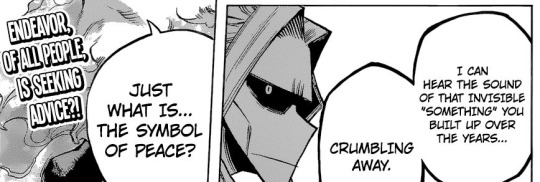
2. A Show Parent
Psychological projection is a defense mechanism people subconsciously employ in order to cope with difficult feelings or emotions. Psychological projection involves projecting undesirable feelings or emotions onto someone else, rather than admitting to or dealing with the unwanted feelings.

Endeavor is constantly battling with his own feelings of inferiority in weakness. However rather than process these feelings in healthy ways, Endeavor has always chosen to take his feelings out on his family. The reason why is because from the start Endeavor has viewed his family in a selfish way, they existed, and continue to exist for him and not the other way around.
The way Enji projects on his family is actually for pretty common every day reasons. Enji himself feels like he can’t achieve what he wanted out of life. He wasn’t good enough to become number one, he couldn’t hack it and therefore he’ll never be good enough. That’s why he made the decision to instead try to live vicariously through Shoto, who he sees as an extension of himself. Enji has projected all of his wants and desires entirely onto Shoto. When he was raising Shoto, it was never about having Shoto’s needs met, but rather what Enji’s wants were.


Enji feels that he himself is not good enough so he projects himself onto Shoto to accomplish what he can’t, belcause he thinks he will be able to find the fulfillment he’s seeking that way. It’s the same as a person with dreams of becoming an actor pushing their child onto the stage at young ages instead of letting them go to school with all of the other kids. It’s the same as a person who wasn’t able to achieve their dreams in sports pushing their kid to be good at sports. In that sense Enji is not Todoroki’s father, he is his coach, or his manager. He’s not responsible for taking care of a child he’s raising them for a purpose.

This is the reason why we see Enji get physically angry at Shoto. Enji has so thoroughly projected himself onto Shoto, that anything Shoto wants outside of what Enji wants, Enji perceives as resistance. Enji does not seem to get that a five year old can’t take the intensive training because he sees himself as that five year old. He thinks that Shoto must just not want it enough. That he’s not motivated enough. That he’s resisting him purposefully. It’s the same reason as Bakugo getting violent towards the unconscious Shoto near the end, when Shoto stopped fighting him seriously Bakugo in his fragility perceived it as Shoto holding back from him on purpose because he was looking down on him.

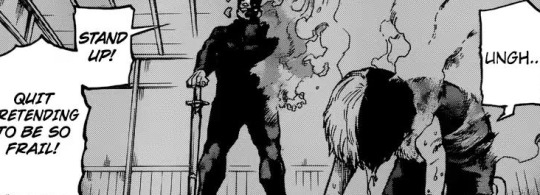
If Shoto succeeds then Enji expects to feel that success. If Shoto fails that means Enji is not only reminded of his own inferiority again, but he also is forced to relive his lost dreams. Shoto doesn’t know any of that though, he’s just Shoto, just a kid, so of course he’s going to fall short of Enji’s extremely schewed expectations which is where the negative feedback loop beings.
Because, even though Enji is using his family to try to make himself feel better that doesn’t work either. The truth is Enji can’t live vicariously through his son. Shoto’s success is not his success, and Shoto himself even wants nothing to do with him anymore. Enji has been using his family for completely selfish reasons up to this point and we reach a point in the narrative where Enji at least seems to grasp the fallout of his actions. Enji is at least aware of the fact that his family doesn’t like him, and that he’s done a bad.
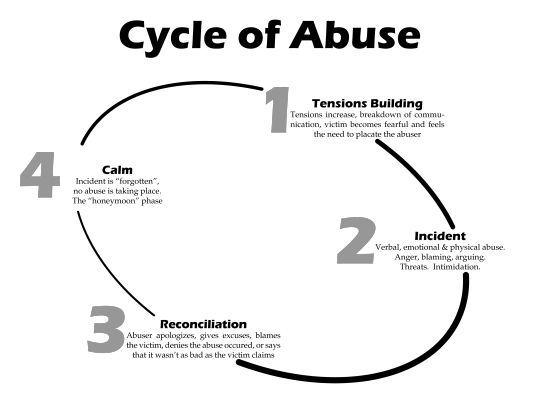
Reconciliation and calm are both stages that are written into the cycle of abuse for a reason. Most abusers are not heartless monsters, but rather humans. The frightening thing is abuse is a very normal thing, that arises from normal circumstances. Almost anybody can become an abuser, because it’s an abuse of power, it’s a cycle people get trapped in. A lot of abusers realize that what they are doing is wrong, this is called th reconciliation stage of abuse. Most people do in fact feel bad about it when they hurt another person and want to make ammends.
The reason abuse repeats however is because the core behavior does not change, and the power dynamic remains in place. Abusers apologize for the wounds they caused, but don’t really address the problems of their behavior on a deeper level, and because of that they let the tensions build again and another incident always occurs.
So what we are seeing post All Might retirement is not really a change in Enji’s behavior, because the core of who he is remains the same. He has perhaps had a change in motivation, he’s realized that trying to be the number one hero is never going to get him what he wants, and the way he’s treated his family has made his family hate him. However, he never addresses the core of the issue which is that he thinks his family exists for his sake. This is not my analysis these are things Enji has literally said, not in the tournament arc but post Kamino. Endeavor still says I’m going to leave everything to Shoto. Not even asking what Shoto wants to be. He still sees Shoto as his heir who exists to carry on his legacy.
Enji is still essentially doing exactly what he did before and expecting a different result. He even says so to Shoto, if he’s a good enough hero, then Shoto will watch him, and be proud of him. These are Endeavor’s own selfish motivaions and not what the other people around him really want him to do. He’s doing this for the acknowledgement he thinks he deserves, and the attention from his family he thinks he deserves and not really for altruisitic or heroic reasons.
Enji repeats a lot of his behavior from before. He still piles attention and attention onto Shoto that Shoto does not want. He is still essentially projecting himself onto Shoto and the rest of his family, that behavior has not changed, it’s just his method. He thinks if he becomes number one dad now instead of number one hero that will get him the sense of accomplishment he craves. The problem is underneath all of his actions, Enji has yet to really grasp what he did wrong. He doesn’t grasp how selfish his actions are. He doesn’t seem to understand how messed up it is, that he seems to think his family exists for his sake. He found a wife, he had children, he had Shoto, not because he wanted to make a family happy but because he wanted to use them to further his own amibtions to become a hero.
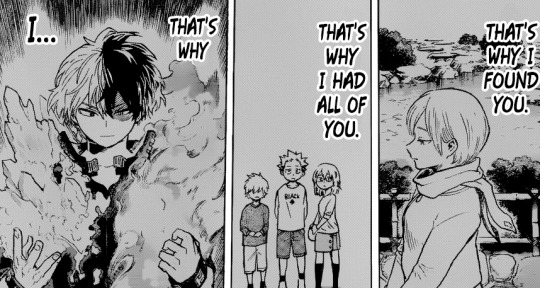
Enji is both capable of realizing that he hurt people, and feeling genuine remorse fo his actions but also not really making any signficant changes for his behavior. The fact that both of these can be true simultaneously is what allows abuse to continue.
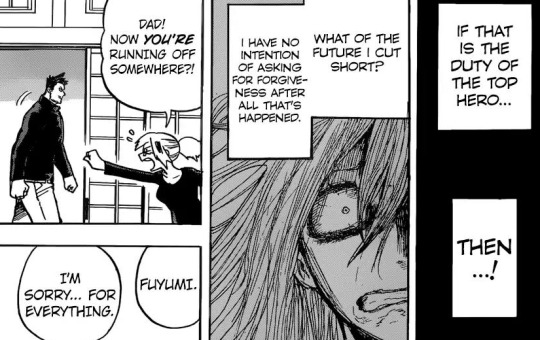
While he knows he did something wrong you also get a sense he doesn’t truly understand how truly heinous some of his actions were. Enji always has this narrative inside of his head that he simply made a mistake somewhere along the way, that he acted without even realizing what he was doing.
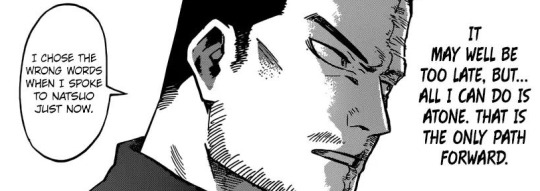
It’s not that Natsuo is angry with him and will never stop being angry with him, it’s that Enji has somehow said the wrong words by mistake. It’s not that Enji violently beat a child because he was angry that child wasn’t living up to his impossible standards, but Enji somehow just ignored Shoto’s wishes.


He always makes it sound like it was accidental, like he didn’t know what he was doing, like he somehow didn’t mean to abuse them. He wasn’t beating up a little kid he just ignored Shoto’s wishes and it somehow went wrong along the way. This complete lack of culpability that Enji has towards his own actions is also what leads him to repeat several really bad aspects of his behavior, such as hyperfocusing on Shoto to the point of ignoring Fuyumi and Natsuo, forcing Shoto to live up to his legacy and accept his help, still vicariously living through Shoto instead of letting Shoto be his own person.
Enji doesn’t address the root cause of the behavior and doesn’t change himself in any real way. The bad behavior repeats. The cycle continues. What Enji has been avoiding and what he needs to acknowledge is that there was genuine malice in the way he treated his kids. He sees his whole family as existing for his sake, to meet his own emotional needs and when they failed he always took it out on them.
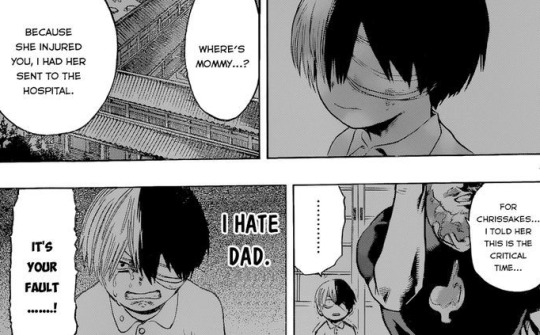
For Enji it’s always Enji first and everyone else second. It’s always primarily about what Enji wants. He doesn’t seem other people, only himself, and what he wants. That’s why when Shoto literally has half of his face burned off as a result of Enji’s actions, all Enji really cares about is that it’s going to interrupt Shoto’s training.
Whenever Enji’s family existed outside of what he wanted them to be, or got in his way in any significant way he always vented his frustation on them. He resorts to hitting for the same reason that Bakugo always feels the need to bully Deku. A grown up bully. Enji needs to make others feel small to feel assured of his own bigness. Deku has to always be underneath Bakugo, otherwise Bakugo’s worthless. Enji has to put his family back in their place. If they resist or show desires of their own otuside of what Enji needs for them he turns violent to try to force them back. It all arises from an incredibly unhealthy way of viewing himself and his own emotions yes, but it’s also something that other people suffer the consequences of.

His family exists for his sake, which is why he’s at the same time both extremely controlling of them, but also just straight up ignores the ones who aren’t useful to him.
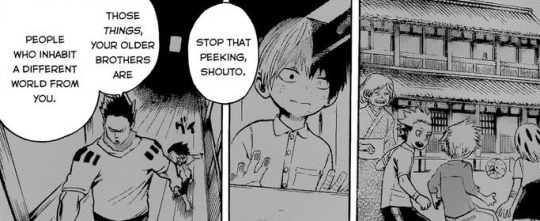
These aren’t a result of Enji going too far, these are all intentional cases of neglect. Especially if you consider the way Natsuo and the others were treated. Enji didn’t even bother to take care of them and raise them as his children because they weren’t of any use to his ambitions.

He straight up had no presence in their lives whatsoever. These are things he intentionally chose to do. For his own selfish reasons, because he thought his children existed for his own happiness and not the other way around that he was not responsible for his children.
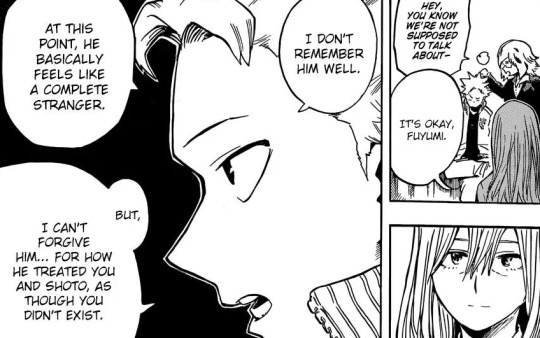
These aren’t things that can happen on accident. Neglect is as much of an abusive behavior as what was done to Shoto. It’s a parent failing even their basic responsibilities as a parent to be present and around in their child’s life.

Even the children he neglects he still controls though. When Natsuo’s cooking wasn’t good enough, Enji forced him to stop cooking anymore.

Enji had to have intentionally does these things, but when confronted with them he always acts clueless. He even claims to Natsuo’s face it was never his intention to shut any of them out of his life, even though he literally says on panel in the past that Shoto shouldn’t pay attention to his siblings because his brothers were failures.

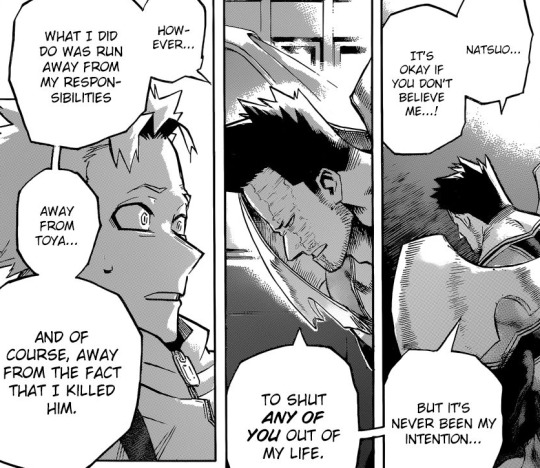

He’s even referred to his other children as things like Shoto is somehow different from them. So how can both of these things be true at the same time? Enji had to have chosen to done these things to intentionally neglect his family, so how can he claim he never meant to shut them out of his life? How can Enji both get genuinely hateful of his children, especially Shoto when they don’t act the way he wants them to, and yet also want to do the best for his family? How can he be completely absent in Natsuo’s life his entire life and yet claim to have wanted the best for him? How is Enji capable of feeling genuine remorse for his actions and realizing that they are wrong, and still have done what he did? It’s at this point we reach the psyhological excuses. The great many hoops that he’s jumped through and mental gymnastics Enji has performed to justify himself.
3. The Shadow of the Hero
So there seems to be two contradictory sides to Enji. There is Endeavor the hero who stops at nothing to be number one who sees nothing else but his ambition and his burning drive to be better, and then there’s Todoroki Enji the family man who just seems to be sort of awkward, emotionally absent, and not at all present in his children’s lives.
Endeavor is overconfident, short tempered, and also an extremely volatile person who will get violently angry if the wrong buttons are pushed. Enji is very quiet and almost self reflective. As if Endeavor is almost always burning, and Enji is burnt out. We see this same kind of emotional dissonance happen with Bakugo too, Bakugo is either on top of the world at which point he’s firing on all cyllinders and acts like an overenthusiastic angry idiot, or he’s very quiet, withdrawn and tends to dump on himself a lot. It’s important to remember that neither of them handle their emotions in any kind of remotely healthy way, so in Enji’s case it makes sense that when he’s not angry he just becomes kind of withdrawn and empty. A person who doesn’t know how to deal with emotions becomes very emotionally awkward when they’re asked to do anything besides, be angry, or punch a villain.
However it goes to a much more extreme extent with Endeavor. To the point where it does almost seem like there are two people. There’s the much more calmer, and reasonable Enji that he has been showing around his family lately.
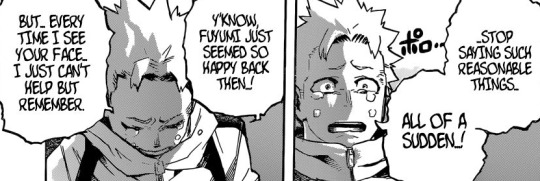
Which even Natsuo says that this change is so sudden and different it’s unnatural. I call this “good behavior” Enji. It’s when he’s restraining himself and holding himself back because he has at least realized that a lot of his interactions with his family in the past were wrong. But good behavior once again doesn’t necessarily mean a change in one’s self, because as stated above there’s a stage in the cycle of abuse specifically for when the abuser starts acting better for a period of time.
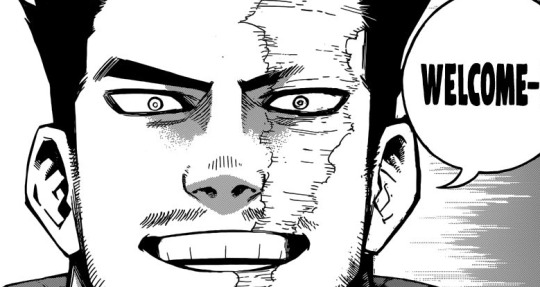
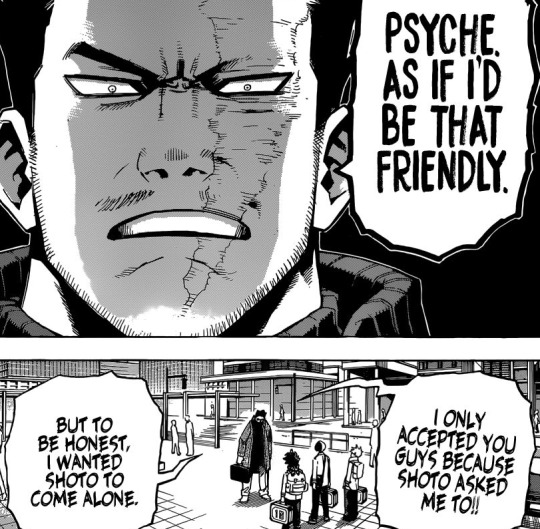
There has always been two faces to Endeavor. Not only does Endeavor see himself that way, but that’s also the way the public in general reacts to him. There is Endeavor the hero, and Enji the person. Shoto even comments on this word for word, that he knows Enji is a very respectable hero especially to the public but that doesn’t cancel out a single thing he did.
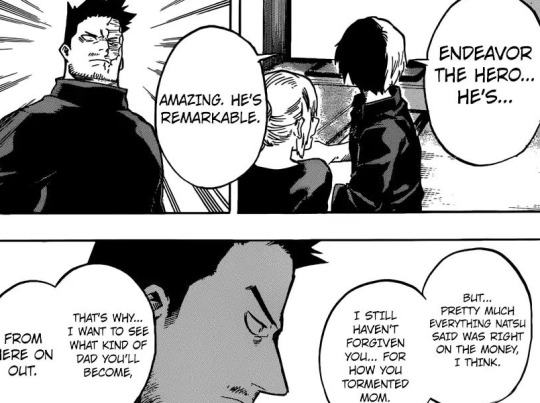
This is where we get into the psychological excuses. Enji’s arc deals with heavy Jungian themes, specifically that of the shadow.
In Jungian psychology, the "shadow", "Id", or "shadow aspect/archetype" may refer to (1) an unconscious aspect of the personality which the conscious ego does not identify in itself, or (2) the entirety of the unconscious, i.e., everything of which a person is not fully conscious. In short, the shadow is the unknown side.
Because one tends to reject or remain ignorant of the least desirable aspects of one's personality, the shadow is largely negative. There are, however, positive aspects that may also remain hidden in one's shadow (especially in people with low self-esteem, anxieties, and false beliefs).
For Enji, his conscious personality is Endeavor the hero. That’s the one everyone sees and reacts to. However, his shadow his the actions he’s done to his own family, what he keeps hidden and concealed from the world. The things he refuses to acknowledge such as how selfish his actions truly were.
Enji has a narrative for himself where everything he did was just because he wanted to be the best possible hero he can be. Even though his actions are entirely selfish, he’s convinced himself that he’s doing these things for Shoto, for his family. The problem is Enji’s entire identity is so focused around being a hero that he doesn’t really have an identity, or much of a personality outside of his career as a hero which is why he’s so underdeveloped as a person. Being a hero is his life. He doesn’t see the parts of his life that don’t relate to his career as a hero.
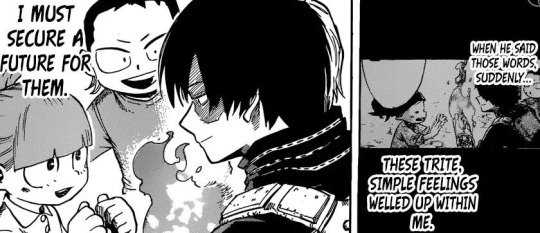
He’s able to ignore the selfish aspect of his actions. All of the contrdictory parts of his actions because he’s in denial. He still sees himself as that hero who wanted to be number one. He thinks everything he did was in favor of that and he just messed up along the way. It doesn’t occur to him that he had geniune malice towards his children, or his family because he chooses to ignore those inconvenient points of his psychology.
Enji is, two people in a sense. It’s because he revolves everything in his life around being the best hero he absolutely can be, that he doesn’t see how his actions are downright villainous. Enji is essentially trying to have it both ways. He thinks he can become the best hero that he can be, and also the best dad at the same time.
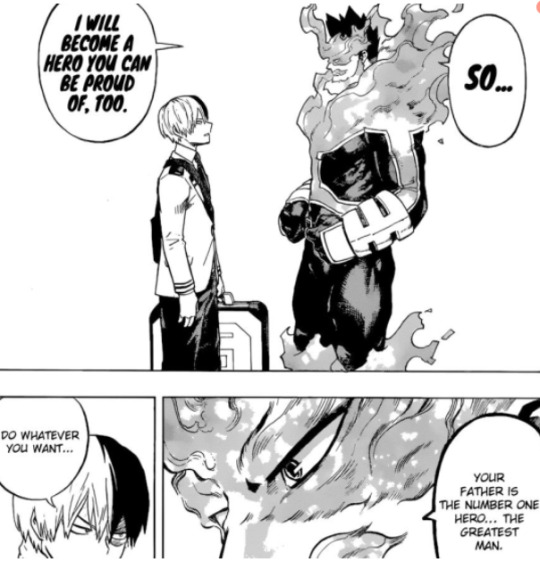
However, his behavior is the same. He’s not trying to prove himself as a father not really, he’s just doing the same thing he always did which is put his job as a hero above everything else. Enji is just so completely in his own head, so in denial of his own actions that he just doesn’t see these things.
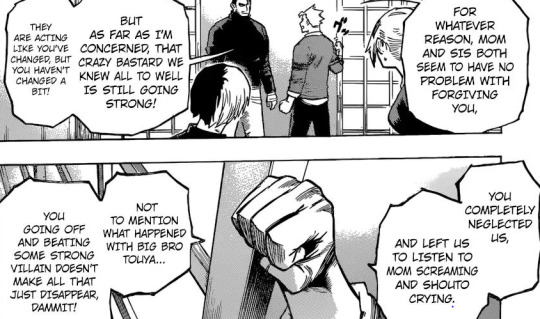
Enji’s actions are a shadow that have escaped from him because his way of atoning and fighting against his past actions is to just do the same thing he’s always did and try his best as a hero. Even though being a hero is literally what caused him to abuse his family, and Natsuo and Todoroki have both pointed out several times that being a good hero doesn’t really atone for what he did in any real way.

Enji’s narrative for himself is that his attempt to be number one was a good thing. That his striving to be the best hero he could be was a good thing. It just somehow got bad results for him. He doesn’t really understand how he got to point A and point B, and part of that is again society’s image of Endeavor the Hero is pretty messed up too. Everyone around him praises Endeavor for being a hero while absolutely nobody talks about what happened in his home life and therefore Endeavor faces no real consequences for it.

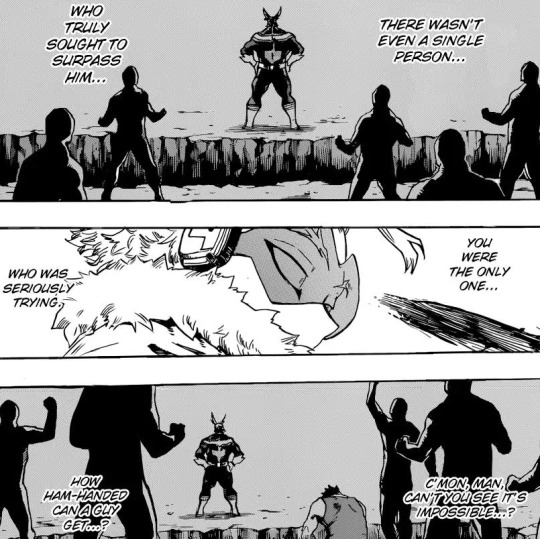
Everyone sees this heroic figure out of the image that Enji projects. Because that’s the light. That’s who he is on the surface. If you look on the surface of his actions only you just see a guy who doesn’t know how to give up, and was trying his best to be number one. It almost looks heroic to see his struggle. However, once again if you only view things from the surface you can’t really understand him or his actions. Which is why Endeavor only viewing himself as Endeavor the hero misses his own shadow and what he’s done to the other people around him.
The person who Endeavor thinks he is, and who Enji really is are two different people. This is because of that unacknowledged shadow. It’s because Endeavor has this huge selfish element to his actions that he’s just completely in denial of. Not because he doesn’t feel guilt for his actions, but because he does and he’s avoiding it.
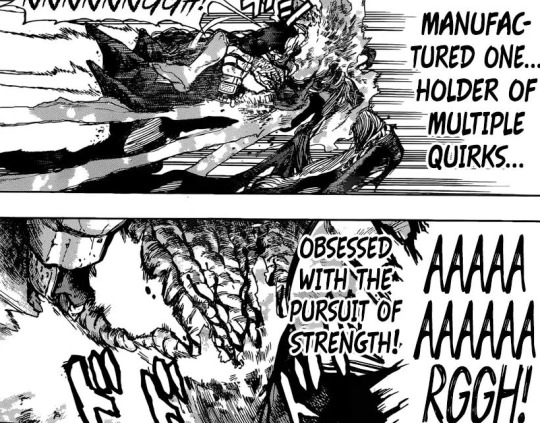
Enji sees himself in the high end Nomu he struggles against, but even that is an incorrect viewing of himself. Nomus are victims, ultimately. They were people who were kidnapped and had multiple quirks loaded into them in the name of mad science. The Nomu is Todoroki, Enji is Ujiko. He’s the one who created several children trying to mix quirks together for his own purposes and then dodged responsibility for that for years. He’s not the monster, he’s Doctor Frankenstein himself.

Enji when confronted with these behaviors, with the absolute worst of his personality, and the dark sides of all of his intentions never acknowledges them. He never tries to integrate them into who he is as a person. He just tries to fight against them and defeat them.
“Unless we do conscious work on it, the shadow is almost always projected; that is it is neatly liad on someone or something else we do so we do not take responsibility for it.”
Robert Jonson
You don’t destroy a shadow. You don’t make the bad things you’ve done and the bad parts of your personality go away. The only way to defeat the shadow is to integrate it and consciously acknowledge that you are like this. This shadow stuff is not something I’m applying to the text either, the text directly references it.
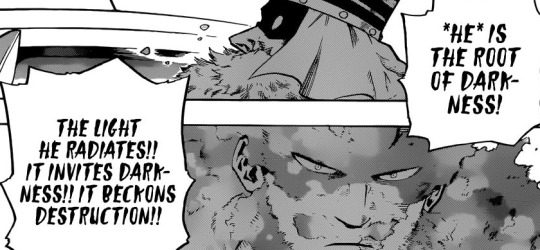
This is Jungian symbolism. The light of the conscious mind creates the shadow. It’s because people only pay attention to Endeavor that hero, that his shadow Enji the person becomes thicker and blacker. The longer people go without acknowledging it, the darker his shadow will become.
Which is why Dabi is in a way his shadow as well. The violent parts of his personality that Enji has failed to acknowledge or do anything about, part of Enji that still believes that the only thing that matters is strength.
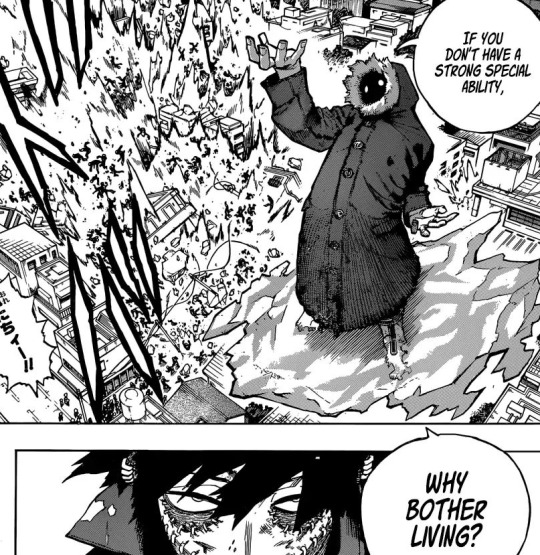
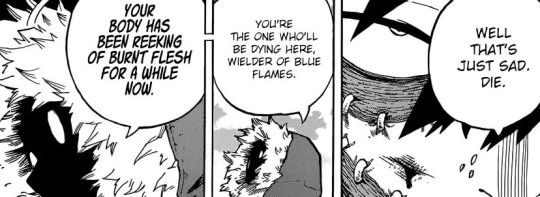
Enji would never approve of Dabi’s actions, and yet Enji also created Dabi. Once again think of frankenstein and the monster. Dabi wouldn’t even exist if Enji had never abused his family. The monster argues against Doctor Frankenstein that yes he has murdered people, but he never would have existed in the first place unless the doctor had created him which manes the doctor shares respsonsibility for even the unintended consequences of his actions. A person is responsible for their shadow, intentional or not. Dabi is the shadow of Endeavor’s actions in human form.
He exists to bring into conflict what Enji has been ignoring. That he can’t be good to his family and be a good hero at the same time, because his drive to be a hero was the source of his abusive behavior in the first place and drove him to do what he did to his family.
Enji is a very selfish person who hasn’t confronted his own selfishness in any significant way. Do I care that he’s only atoning for selfish reasons. No, that’s not the problem exactly. You could argue that all atonement is selfish in nature. The fact that Bakugo and Enji are very self-driven individuals is not necessarily the problem, it’s not a bad thing to want to be selfish, or even desire to better yourself. It can lead to good things. It’s that in Enji’s case, his selfishness always comes at the expense of others. He completely shuts people out and doesn’t even see them. All he sees is what he wants to see. Above all else this viewpoint of the world is very narrow and self-serving. He only sees the surface of his own actions. He only ever sees himself as the hero and can’t acknowledge that to his family he’s the villain.

Enji only ever saw himself and his self-centered view of the world, and everybody else, including the children he was responsible for and the wife he forced a marriage on only ever got in his way, which is why he resented them. If Enji wants to atone that’s one thing, but if Enji wants to stop being such a selfish person and truly do things for the sake of his family as he’s stated he wants to in the past that means acknowledging his actions.
Enji continues to be a hero because that’s what he wants, it’s what he’s built his whole life around. He even sees his path forward to atonement as just continuing to do his job as a hero, even when he’s told by Natsuo that won’t work. Which is why the only real substantial way for Enji to change is to actually have to give something up. To acknowledge that he’s in fact a bad hero. He even stated himself, there’s something he wants even more than being a hero now. He wants Toya to be there.
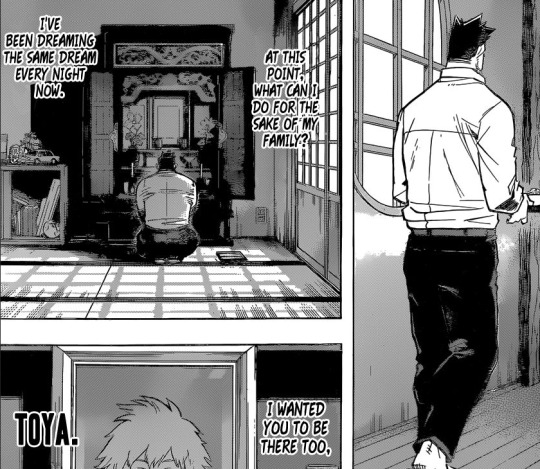
Which is why Dabi is such an important character because he not only forces Enji to realize the worst of his actions but also to choose, between what is best for himself and his career as a hero which is the only thing he’s ever really cared about and what is best for his family. It’s only in the confrontation with his shadow that we can see what Enji is really made of.
#todoroki enji#endeavor#meta#mha meta#my hero academia meta#bakugo katsuki#todoroki touya#foiling#dabi
482 notes
·
View notes
Text
Inspired by this post, I wanted to reiterate a view I’ve long held.
Redemption at its core is a three-step process: feel remorse for the wrong you’ve done, commit to stop doing wrong, and commit to start doing right. And while it’s mostly possible for any villainous character to do this, the question is whether it’s plausible based on how the villainous character is established and written...and if it’s plausible, would it still make sense if they don’t do it? Once Upon a Time’s redeemed mainstay villains provide great examples:

Regina and Zelena - NOT PLAUSIBLE.
Whether you like these characters and their redemptions or not, the fact is that the writers royally fucked up when it came to establishing them in their debut story arcs. Regina was established as a warped psychopath who is willing to kill her own father to enact a horrible curse that will grant her total control over the eternally miserable population of an entire realm solely because she irrationally blames a child for her boyfriend’s death and can’t feel happy unless said child, now grown-up, is “punished”. The only hint at a possible redemption was her love for her adopted son Henry, and even that eventually went out the window in the following story arc where a brief attempted redemption was followed by her being even worse than she was before in both flashbacks and the present day! Zelena, meanwhile, had power in Oz and could have had it good there, but she was so obsessively jealous of the sister she’d never met and lustful over their mutual magic teacher that she would uproot time itself just to ensure Regina was never born and that she would be the one to cast the Dark Curse for Rumple; still not explaining how she’d get around the whole “she’d have to crush his heart to do it” factor which was why Rumple rejected her in favor of Regina in the first place. Oh, and both of these ladies are straight-up rapists, with Regina even murdering her rape victim.
So the problem with the Mills Sisters and their redemption is that it is totally dependent on them just...changing their established characters on a dime. In Season 3 and Season 5 respectively, they’re still not good people at the start but are suddenly psychologically stable and totally fine with working with the good guys in pursuit of a mutual goal. This makes them plausibly redeemable, but it also makes them wildly different characters than they were previously shown to be. The trick worked on many viewers, but it also failed on many others, or it worked in regards to one of them but not in regards to the other. For my money, I find redeemed Zelena to be more tolerable since didn’t backtrack as much nor was she rewarded for her redemption far beyond what she deserved, but both her and Regina were not the kinds of characters who could feasibly be redeemed in their initial two seasonal story arcs.
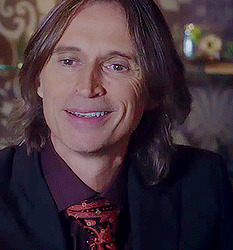
Rumpelstiltskin - PLAUSIBLE, BUT UNLIKELY.
From the beginning, many people said that contrary to Regina, Rumple was established in Season 1 as a character who would plausibly be redeemed. His backstory, certain character traits, and motivation for his role in the Dark Curse certainly made him more appealing than Regina. However, I never felt that plausibility meant that it was likely with Rumple. The whole point of his character seemed to be that yes, he could be a better man than he is, but he actively chooses not to be because he’s a selfish, power-hungry coward. And he was one even as a struggling peasant and single father, something he flat-out admits. Many people point to his desire to find his son and make amends with him as altruistic, but it really isn’t, especially when not only is he willing to do horrible things (the same kind of horrible things that drove his son away to begin with) to make it happen just to alleviate his own guilt, but he isn’t willing to achieve this goal without also working in a means for him to keep his power, which was what the whole True Love Potion thing was about. The best that Rumple could ever hope for was a Redemption Equals Death rather than a living, continuous redemption.
Oh, yeah. That happened.
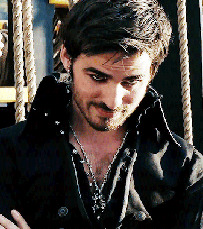
Captain Hook - PLAUSIBLE AND LIKELY.
Killian Jones, aka Captain Hook, was introduced as a pirate with an honor code who then had his lover murdered in front of him and his hand chopped off for good measure. This drove him to become a ruthless, dishonorable seeker of vengeance, willing to stop at nothing to get what he wants and caring for no-one and nothing else. And the more we see of him, the more apparent it becomes that there is a deep well of self-loathing underneath the surface: it’s because he believes he’s a wretch doomed to both an unhappy life and an unhappy afterlife that he is able to shut off his conscience and honor and positive emotions. In his depressed, nihilistic worldview, nothing matters except getting his revenge and then dying to suffer the consequences of all the wrongs he’s committed in pursuit of it. And that perfectly sets up the question of what would happen if that worldview was challenged, and if he realized that happiness and salvation were still possible and that seeking revenge is what’s keeping him miserable? Answer: he’d feel remorse, stop doing evil, and commit himself to doing good.
Hook’s redemption is plausible and sensible because unlike the Mills Sisters, the object of his revenge is someone who actually wronged him, and the hurting of other people caught in the crossfire stems from a place of misery and self-loathing rather than from a sadistic sense of satisfaction from hurting others. And unlike Rumple, his redemption is likely because he’s not a coward, and his ruthless selfishness is a flaw we see him develop and can thus believe he can un-develop too rather than being a central component of his character from the start. Rumple stans point to him bullying peasant Rumple when the latter is pleading for his wife back in his formal introductory scene, which ignores that he gives Rumple the chance to fight honorably, doesn’t hurt him when he refuses and allows him to leave his ship totally unscathed, and later admits that if Rumple had just fought him he’d have let him talk it out with Milah. Him being kind of a jerk about it is because he’s a freaking pirate captain, it’s part of the job description. Hook is hands-down the least evil of the mainstay villains, and him joining the good guys and becoming the heroine’s love interest was an organic development.
#Once Upon a Time#ABC#Redemption#Villains#Comparison#Opinion#Analysis#Regina Mills#The Evil Queen#Zelena#The Wicked Witch of the West#Rumpelstiltskin#Mr. Gold#Killian Jones#Captain Hook#Anti-Regina#Anti-Zelena#Anti-Rumple#Anti-Rumpelstiltskin#(Sort of)
33 notes
·
View notes
Text
An Extremely Personal Look at my Disconnect with Frozen 2
I’m trans and I’ve been closeted for so long that being in the closet has begun to feel like a futile routine, an inescapability born of my own weakness.
That’s... not how a post about a Disney film usually starts, is it?
But, like the title of my post says, this reflection is personal. I’m allowing myself to be vulnerable.
Because of my life experience, I’ve connected deeply with the character of Elsa over the years. I suppose that’s not a surprise. Elsa’s powers can serve as a broad metaphor for aspects of someone’s identity that others can stigmatize - whether that be read as gender, sexuality, anxiety, or depression. Part of the reason Elsa became so incredibly popular in the first film is because her struggle with her powers could reflect so many various people’s struggles with their own identities.
Frozen 2 actually leans into that broad metaphor of Elsa’s powers reflecting personal identity - a part of oneself that is unique but beautiful in its uniqueness. The lyrics of Show Yourself reinforce this, telling Elsa that “you are the one you’ve been waiting for all of your life.” So I should love Frozen 2. I want to love Frozen 2. There are things I absolutely do love about Frozen 2.
But I have a complicated disconnect with the way the film approaches the origin of Elsa’s powers.

The film makes Elsa’s powers a gift from the spirits - and also suggests that they are a gift for Iduna because she saved Agnarr’s life. By introducing the idea that Elsa’s powers originate not because of anything to do with Elsa herself but because of an event that happened before Elsa was even born, the film kind of undermines the metaphor of Elsa’s powers reflecting a key aspect of her identity.
Identity doesn’t work like that. I’m not trans because of other people’s actions. My trans-ness is a part of me. It comes from me. It wasn’t decided that I was trans so that my mother could have a “reward” for her own righteousness. If some divinity did bestow my trans-ness upon me, I would be disturbed to find out if they didn't do it for my sake - if they did it because my mother did something and I was only an aspect of the equation insomuch as I related to her...
To me, that thought isn’t empowering. And it still wouldn’t be empowering even if my mother were as loving as Iduna - because it would tell me that I’m only a vessel...
There’s a difference between saying, “Elsa is a gift because Iduna’s good deed was rewarded with her,” and saying, “Elsa is a gift simply because she is who she is, Elsa is a gift by simply existing.” One is conditional and one is unconditional. One uses Elsa to prop up Iduna’s actions and the other loves Elsa for herself.
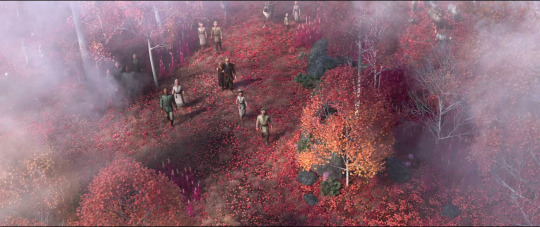
(Also, I’d argue that a better gift for Iduna’s goodness would be to let her see her family again. Why cut the Northuldra off from the world when the fault was solely Arendelle’s? I’ve seen some people speculate that Arendelle could have wiped the Northuldra out after Runeard’s death and the mist protects them, but what does that reading make us think of Agnarr if we assume he could be complicit in genocide? Why “protect” the Northuldra in a way that will negatively psychologically impact a generation of them? Why let them suffer? No, that rationale doesn’t make sense to me. The whole mist scenario smacks of the “both-sides-ism” of white writers - but that’s a discussion for another time, a discussion I’m not really qualified to comment on in depth. I need to return to Elsa.)
The interesting thing is, after introducing the concept that the spirits gifted Elsa’s powers to celebrate Iduna’s nobility, the film doesn’t really bring up that angle again. Instead, it tries to frame “we made you a gift for someone else’s sake in a scenario where your individual identity is irrelevant because you did not even yet have a consciousness” and “you are a gift by being you” as being the same thing. But those two things are not the same.
Before F2, Elsa continually frames herself based on what she can do for the sake of others - even at the expense of herself. Clearly, with Frozen 2, the filmmakers wanted to have Elsa come into fuller self-acceptance and love herself for being herself - but that isn’t quite what they wrote. By making Elsa a reward for her mother and defining her powers based only on how Elsa relates to her, the film itself frames Elsa based on what she can be for the sake of others - while disregarding Elsa’s own selfhood and identity. Elsa’s self-identity is so immaterial to the decision to give her powers that it happens before she is even born.
I know the film may not have intended this, but it ends up validating Elsa’s negative thought processes in the act of nominally ‘refuting’ them. All because of those few lines trying to explain why Elsa has powers.
Show Yourself tries to fix this by basically brushing aside the “you were a gift from the spirits for Iduna’s actions” revelation and focusing on Iduna and Elsa’s familial connection and love. This is why Show Yourself is so much more amazing than the earlier revelation and an admittedly breathtaking scene. The focus becomes “you are the one you’ve been waiting for all of your life” - you are a gift to the world simply by being you - and that is so much better than the earlier revelation, but the damage of the earlier revelation has already been done.

Now, the film has two slightly different interpretations of the word “gift” that it tries to use interchangeably - in spite of the fact those two interpretations subtly contradict. The film never comes back to the “gift for Iduna’s good deed” element. It doesn’t establish that what happens in Ahtohallan is an expansion of that or an emendation to that. It doesn’t address the dubious implications of it. It just brushes it aside, never to explore it again.
Indeed, as I’ve said in other posts, if you take out those few lines from earlier, you lose the internal narrative contradiction and the film actually becomes stronger.
So why are they there at all?
I think they’re there because they give a seemingly simple, external explanation for why Elsa has powers. Show Yourself is more focused on what being at peace with yourself means to Elsa emotionally (that’s why it’s better, in my opinion), but the “the spirits gave her powers because of her mother” lines are there because the writers felt they needed to give a direct explanation of Elsa’s magic.
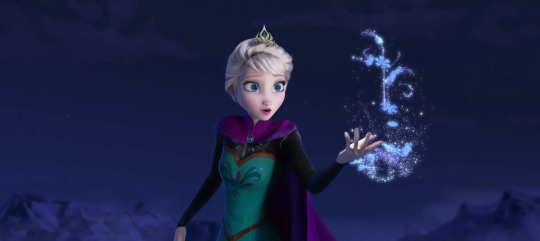
Here’s a hot take, though: Elsa’s powers work better without an explanation. The fact she was just “born with them” in the first film was part of what led to her broad appeal. It allowed countless people to latch onto her because - people who society deems “other?” We’re just people. We’re ordinary. We’re human. We just are. The first film understood this - and for all of Elsa’s magical abilities, she was allowed to just be. And the lack of any lore surrounding Elsa’s powers meant that scores of different people could identify with Elsa. Her powers were vague enough that they could stand in for any unique aspect of an individual’s identity. The point wasn’t where they came from; the point was what they meant.
But after the first film came out, I kept seeing the refrain: “Why do they never explain Elsa’s powers? That’s a plot hole.” it isn’t a plot hole. It isn’t a plot hole any more than not explaining how the Wicked Queen in Snow White got a magic mirror is a plot hole. Something being unexplained isn’t a plot hole. That’s not what “plot hole” means. But I can understand why the writers, after hearing things like that for years, felt like they had to address that explanation.
And in doing so, they tried admirably to connect that plot point to an internal journey for Elsa - and created some absolutely beautiful elements within the film - like Show Yourself. Although, in this post, I’m documenting flaws I see in Frozen 2 and my own disconnect with it, I want to stress that I respect the artists and creatives who brought the film into being and I value their work.
In the process of their efforts, however, they inadvertently opened up internal contradictions within their own narrative; opened up unfortunate implications when it came to their commentary on colonization; and opened up unfortunate implications when it came to their discussions of individuality and identity.
As I have said, there is much I admire about Frozen 2. And I know that my words here come from a very personal place. If Elsa’s arc in Frozen 2 works for you, you’re valid. This isn’t a takedown of Frozen 2. None of my more critical posts about Frozen 2 are. I don’t want to take anything away from you. You’re valid.
It’s just that my perspective is valid too. I know, there are scores of critiques of Frozen 2 and some of them are absolutely terrible or just plain racist, but I hope that as you read this, you’ll understand that my perspective comes from the heart and that I’ve done my best to support it with examples from the text of the film. I hope that you’ll read this. I’m writing it to be heard - because I feel like my perspective gets drowned out a lot, regardless of the posts I make. Flashier positive posts draw one part of the fandom’s attention and flashier and more toxic negative posts draw another part’s attention.
I’m just trying to express my thoughts in a cohesive way, trying to be heard and trying not to feel guilty. (Because I do feel guilty writing posts like these. I get scared that people resent them or that I’m spoiling other people’s fun - even though more toxic people make much more incoherent arguments and they don’t feel guilt, while I try to support all my claims.) I feel like I’m relentlessly apologetic to others, always begging, I’m sorry I’m sorry I’m sorry, always... feeling guilty for even having a perspective like this. As though I feel there’s something wrong with me for simply having a perspective. As though I’m scared it somehow invalidates all the good things I’ve said about the film elsewhere or will make people hate me.
(Not to connect everything back to my being closeted, but I feel like that entrenches a guilt in me that manifests even as I talk about innocuous things like fandom opinions).
But I just... want to speak. I hope that’s not bad, is it? And I hope this post finds a receptive audience. I know it’s personal. I know it’s heavily informed by my own personal experience and perspective, but I hope it’s nuanced. And I hope people will read it and, even if they approach the film differently than me, understand.
Thank you.
63 notes
·
View notes
Note
Okay so, I have no idea who Aesma is. What does "Turning Vriska into Homestuck's Aesma" mean in this context?
I really don’t want to get into it much, as Kill Six Billion Demons is truly incredible from top to bottom so far and I think it’s more fun to go in blind. Ideally, ignore everything I have to say and go read it some time. (Be sure to read the text posts under every so-odd page, the sometimes-present hover-over alt-text too, et cetera.) Like, don’t even read this post, even though it isn’t really a spoiler.
However, to sum it up if you want it.....
In the mythological pantheon outlined in K6BD, Aesma is the mother of chaos and quite seemingly the embodiment of the Id. In stories of her exploits with titles like “Aesma and the Three Masters (and the lessons she never learned)”, Aesma is depicted as the epitome of willful selfishness and ignorant wickedness, a committer of atrocities both intentional and inadvertent -- and is also the most beloved of the Creator’s children by said Creator, not just for stripping bare the hubris of others, even the Divine, but for embodying the selfish drive of Life that distinguishes (and in this Creator’s view, should rightly distinguish) the living from nothingness. She is selfish to the point of stupidity, egotistical in a way that is constantly self-defeating, and yet a paradoxically shining example of an attitude one must embrace in some respect to truly strive in life -- and an example none that live should believe themselves above. Even the angels begin their prayers with her name in deference, though not exactly entirely admiringly.
You COULD say that some of the writers of Homestuck^2 love Vriska a bit more than the average fan, to say the least, and a little more than Andrew did. And you could both judge from the story’s current contents and expect from the known views of said writers that they are PERHAPS more likely to focus on how awesome she is than the pain and suffering her continued refusal to learn anything will keep bringing down on everyone. Showing her toxic flaws off, sure, but at the same time (in some crucial ways) having the narrative almost “forgive” them because she gets results. NOT that they've quite done so YET, not entirely! But they might.
That possibility worries me.
As far as Vriska went, the pre-Epilogue ending of Homestuck was pretty perfect for the story’s themes: Vriska DID get to save the day, glory-hogging and fighting Lord English in the way she THOUGHT she wanted... but in the process was denied the Ultimate Reward, was in fact rendered irrelevant in the ways that ACTUALLY mattered and was left excluded from the happiness promised to those who decided that creating the next world and living in it mattered more to them than cosmic victory. She chose relevance over everything else, and Paradox Space cursed her by granting her wish. (Never learning her lesson... and paying dearly for it, in ways she doesn't even realize.)
The Epilogues undermine her further. They show that she was barely a cog in the machine that resulted in Lord English’s defeat. They give her a second POTENTIAL chance at eventual happiness, but do so by “banishing her to irrelevance” and thrusting her into the “non-canon” storyline. It was revealed recently in HS^2 that the history books of the Candy timeline didn’t even really give her actions any credit.
So... pretty much the worst thing I could imagine Homestuck^2 doing -- and I COULD imagine it doing this, unfortunately -- is taking this nigh-unrepentant abuser who has barely regretted her actions and torn the souls and potential out of characters like Tavros who were doomed never to recover from it, and “correcting” this ending a bit. To have her potentially ruin an ENTIRE POST-VICTORY EARTH with another meteor apocalypse (or try to), to continue her same selfish attitude portrayed in FURTHER “heroic” light, and then have the narrative ITSELF imply that everyone should be thanking her in the end????
There are some good lessons to learn from Vriska’s better qualities. However, K6BD’s mythological stories of Aesma treat her depiction VERY carefully, or I guess I should say heavy-handedly -- leaving NO illusions or ambiguity about the evil of her actions, the caustic ignorance inherent in the lessons she refuses to learn, turning a selfish perpetual-child into an almost-pitiable one that ultimately DOES “lose”... even as the story cautions everyone not to pity her, as to think oneself too much “better” than her is a grave and arrogant error. That deliberate, clear nuance would be LOST if the same reverent narrative treatment were ultimately given to Vriska. Homestuck^2 would become a vehicle to forgive her abuse, her choice of ignorance, as something that can be ultimately padded over or mulliganed at the last minute. The stories of Aesma carefully depict her to show that if she had learned ANY lesson -- ANY at all in the multiple opportunities given to her throughout her storied life -- she could have been not just the Creator’s most beloved, but truly the greatest in every respect WE value. And the tragedy that she does not is both unforgivable / deserving of mockery, AND a cautionary, frank depiction of Humanity itself as sharing that same blind failing.
Homestuck is another work that constantly tries to show the value in people who are flawed -- even dangerous. (Unsurprising that they’d share this, given how K6BD began as an adventure on the MSPA Forums.) Trying to blindly do the SAME to Vriska as Aesma, though, to finally end the story of the Homestuck series as one that gives her her “due credit”, risks communicating an awful lesson that her crimes were “worth it” despite trampling over the will of almost everyone else who exists, both inside and outside canon. If it’s not done VERY, VERY CAREFULLY.
I hope they avoid this route altogether, and instead -- since it’s unlikely she’ll purely “die” achieving relevance at the cost of happiness again -- have her finally accept SOME degree of mediocrity in a way that actually learns her a fucking lesson for once, and doesn’t just let Vriska shut her sins into the closet and lean casually on the door, after a brief show of considering contrition or a disproportionately-small sob that her victims’ roiling, broken ghosts would roll their eyes at.
54 notes
·
View notes
Text
Here, have 4.5 pages of rambly Tuon meta. I wrote this to try to get a handle on Tuon’s character, and to develop the theoretical framework for a redemption arc for her. I’m hoping posting this doesn’t cut my motivation to actually write it...
Who is Tuon? Tuon Athaem Kore Paendrag, High Lady, Daughter of the Nine Moons; now the Empress of Seanchan (at least on the westlands side), Fortuona Athaem Kore Paendrag. To borrow some phrasing and framing from @websandwhiskers: She’s the pinnacle of Seanchan culture and an extremely functional tool of the state; responsible (both personally and institutionally) for psychologically and physically torturing people and enslaving them; she also has some compelling moral and personal qualities that she and the state have not yet managed to quash, which kind of makes it all worse, ethically speaking. She’s a villain whom the original narrative neither sufficiently condemns nor sufficiently redeems, married to one of the Big Damn Heroes in a match that’s both very odd couple and very complementary.
She respects people who stand up to her, as long as they aren't 'disrespectful' in the process- and the 'disrespect' is very situational, she'll accept things in private or in non-court settings that she can't let slide in court without losing face and therefore power. She cares very much about the legitimacy of authority, because it correlates positively with stability and is ingrained in her self-image, but she has an autocrat’s idea of what is legitimate. She assumes you know your own self-worth in relation to hers and are prepared to both display it and back it up. She has also internalized that other people's challenges of her are opportunities for her to prove her strength and fitness to rule, and she probably low-key seeks to provoke reactions now as validation/training, for herself and others.
She has rigid moral standards within the context she was raised in, and punishes herself first for perceived failure because if she does it first, perhaps she can avoid someone else doing it, with deadlier results. She has never been allowed to be less than perfect by her culture's standards- she can be (and has been) odd, but she cannot be flawed- and possibly expends all of her natural empathy on others instead of herself, because she can't afford that kind of indulgence herself, but she knows she owes it to lesser beings?
And as @websandwhiskers pointed out, she does have a lot of empathy within allowable contexts, and I think she is willing to push the envelope compared to her peers as long as she/the empire isn't directly threatened. That's what the kiss after Mat let the poisonous snake go was about. The snake was poisonous but not attacking, and not likely to attack unless someone escalated the situation, and Mat deescalated it. No harm, no foul. Mat responded to a fraught situation both logically and mercifully, in the way she imagined she would have if she had been in his shoes and known he same facts he did, and she rewarded him.
She’s competent and charismatic; I hesitate to say that she inspires loyalty in underlings because honestly with the damane it’s brainwashing (eurgh). But Selucia and Karede are both really into her, personally, even when there are societal inducements not to play favorites. Mat is loyal to her, though honestly Mat is loyal to like... anyone he’s responsible for, so maybe it’s more relevant to say that Mat genuinely likes her; at least, he likes the person he thinks he can coax out of her, and in terms of the persona she has more typically, I think he responds well to her competency and self-possession. The ability to project those things is probably a big part of what goes into charisma.
She thinks that the people who oppose her just don't have all the facts. She doesn't like to admit she's changed her mind; it looks like weakness; she's fine identifying it in others but not herself. Ideally she would pretend things have always been the way she now knows they are, and if she can't, she goes for the "Yes [fact], but [here's what I've decided is now germane to the argument at hand]." redefinition of the problem. She always thinks she’s right, though she does tend to leave some space between when she’s decided something and when she promulgates the decision, to allow for opposing arguments.
I think the original relationship Tuon has with omens is that she uses them to look for external justification from the universe for decisions she's already made. (I mostly like Sanderson's Tuon POVs, but I also I think Sanderson sometimes used omens as a 'make Tuon do OOC things for the plot' card.) Tuon's running dialogue with omens also shows that she's always observing the world and interpreting her effect on it and its effect on her. She loses her composure with omens when they are more concrete and less subject to her control (via interpretation), as with Lidya's fortune.
It makes sense that she's super controlling. It was how she was raised, and aside from having loyal/brainwashed companions (who are, themselves, a form of distributed control), being controlling is obviously the only thing that makes her feel safe. It's still interesting how it extends into a dialogue with the Pattern itself. Like Mat, she wants to survive and she wants to go her own way, and also like Mat she's caught up in the Pattern a little more tightly than others. I think she and Mat have both subconsciously decided that the only way to deal with what the universe wants you to do, when the universe is that powerful, is to say "Fine, I didn't really want to do that other thing anyway, let's learn how this path works and play to win."
She knows she makes bad decisions when angry, and I think in general she distrusts strong emotions, or at least tries to hold them at arms' length so they don't form part of her judgment. She's very very good at compartmentalizing, but as a result sometimes emotional stuff will come up and blindside her a little because she doesn't prioritize it or see it as a natural part of her decision-making. I think her emotions do influence her, usually subconsciously, but she's obviously a Thinking type. (Mat is also a compartmentalizer, but more somatic/emotionally focused; he's got his feelings directly wired into his body and together they make decisions that his brain then evaluates a second later, with running commentary that he never expresses to anyone else. They are both comedically un-self-aware, although Tuon is even less self-aware than Mat is, since at least on some level Mat knows he's been repeatedly traumatized even if he tries to pretend he isn't, while Tuon still thinks that her childhood was completely fine.)
Within the original narrative, I think her POVs are always a bit mysterious and her actions are always a little surprising. What’s impressive about that is that this is basically *always* true no matter what setting she’s in and what she’s doing. When you’re in her head you see her thought process ticking away, but RJ and Sanderson both have her constantly withholding important contextual details in her POVs, like Lidya’s prophecy (the hints are there and come out in bits and pieces, but she doesn’t reveal everything and slot it into context until 2 books later). Like with reading Mat, you’re aware that she obviously has reasons for what she’s doing and you even see her decision-making process, but because you’re missing the details, she remains opaque even though you’re in her head. (Mat’s decision-making process is more clear to the reader, but somewhat opaque to himself and definitely opaque to those around him.)
Meanwhile the things Tuon does share via narration or via action are always kind of buck-wild for the reader because her entire deal is such a culture shock. She’s obviously surprising Mat & co, but what’s weird is that she also seems to be constantly surprising her fellow Seanchan. Her scenes with her peers are usually punctuated with shocked murmuring in the background. They have trouble anticipating her, both because she keeps her cards close to her chest, and I also think because she’s a slightly different person from the one who lived her entire life in a cloistered murdersphere in Seanchan, and if she wasn’t a different person after leaving home, she’s definitely one after her kidnapping. But I think she is a fundamentally different person after leaving home, because of the structural parallels she has with Mat.
In Mat’s first POV chapter, he wakes up in Tar Valon with partial amnesia and a much stronger sense of self-preservation than he had before. As everybodyhatesrand points out (crediting but not tagging them since I feel like they wouldn’t appreciate being tagged in Tuon apologia), we have never been in pre-dagger!Mat’s head. We have never been in dagger!Mat’s head. Everyone in the books, throughout the books, is like “At least Mat’s still the same!” and yeah, he does do and say more or less the same things before and after the dagger. But we had to take it on faith that his personality is more or less intact pre- and post-dagger because we, the readers, only know post-dagger!Mat’s inner monologues. The Mat we inhabit in book 3? He’s been broken. The continuity between his old life and his new life has been disrupted (and will continue to be disrupted, including with an actual literal timeline reboot!) He immediately starts off to fix himself, others, and then eventually the world, so it’s motivating, but the hits really just keep coming...
Like Mat, Tuon’s first POV only appears after she’s left the traumatic environment that shaped her. We don’t know what travelling across the sea did to her sense of self (and we can’t really know since we don’t have that in-Seanchan-baseline), though we do know she’s changed after travelling with Mat (aside from catching feelings, I think she learned that the Seanchan are not always in possession of all the facts), and we know what becoming Empress did to her (she doubled down on duty and lost a lot of personal flexibility). I think there are major structural parallels between Mat and Tuon’s POVs because they’re both broken people who try their very best to act as if they are not broken. In Tuon’s case I think she just doesn’t know how broken she is. In Mat’s case, he knows, but he’s doing a weird balancing act of integrating lessons learned (healing!) while also, like, frantically trying to ignore or drown out the emotional cost of trauma (not healing!)
By the end of the series I think Tuon knows, but is not letting herself actually think, that being made damane is a) a real possibility for her, specifically, and b) that it is not, in fact, something she would willingly choose for herself even to serve the empire. I think this is different from the more intellectual disgust of the idea of herself channeling; that's abstract, and she imagines there's an actual choice for the person with the spark between channeling and not channeling, or possibly that there's an actual choice between learning to channel vs not learning to channel if you have the spark inborn. (We know that the actual choice if you have the spark is 'learn to channel properly or die'.) Tuon's out there like "If I were a marath'damane I would simply choose not to channel. RIP to marath'damane but I'm different".
She's never been a marath'damane in the sense of someone who started channeling involuntarily, and isn't interested in imagining herself as one, at least not when confronted by someone who is succeeding in making her angry. So even if you made her choose, as a theoretical marath'damane, between dying and learning to channel properly, I think she'd consider 'learning to channel properly' as 'becoming a murderer' and therefore the choice would be between dying and becoming a murderer. There's a clear argument to be made in that idiom that the marath'damane is 'becoming a murderer' in self-defense, which would have a different moral tenor (manslaughter vs murder). But Tuon strikes me as the type to say in an argument (and probably believe) that "The end result is the same & I would die before compromising my principles.”
I think in the confrontation with Egwene she probably internally justified not putting the collar on because there was a Seanchan audience and because the taunt came from an escaped damane, even though the actual reason was fear that it would work. She’s letting the circumstances invalidate the argument so she doesn’t have to think about it. I think if she were to let herself think about the authentic emotional response- and she probably has, I feel like she does a postmortem on all of her public discomposure- she would consciously know that her instinct was that it would work on her, and furthermore she would know that she does not want to be damane, even if the Empire would require her to be.
If she followed out the chain of reasoning, she’d know that if she were a damane, if she were actually leashed, she would be forced to channel. She’d know because she’s taken great pleasure in training and breaking damane, and she knows how to get damane to channel and how to break them. Therefore, if she were damane, she would know that she would need to be broken, and she knows how she would go about breaking herself. She probably thinks that her last act of free will would be to suicide if she possibly could. But I think that what she’s AFRAID OF is that she would actually convince herself that being the very best damane is all she wants out of life. And that's the scary, universe-ending thought she's avoiding the consequences of, because a) it’s about breaking herself (as Cadsuane points out, no one can easily think about breaking themselves) and b) the fact that she would need to be broken and that she doesn’t like the idea is a sign that she’s not the perfect avatar of the Empire that she thinks she should be.
I think becoming damane has been added- in the bare abstract- to her mental list of the price of failure. It's a very fundamental loss of control and identity, where all she has is resignation and brainwashing that- best case scenario- she does to herself. She's scared of it in a way she was not before, now that it's been made personal. Like Mat, she's going to shove that down deep and ignore the bad scary implications as long as she can, up until the point that they actually disable her or otherwise bleed out into her intellectual or physical world in ways that aren't as ignorable.
But while Tuon thinks she would die before compromising her principles, and even more secretly is extremely afraid that she *wouldn't*, I also think that like Mat, if it came down to it she would transform herself radically to survive *as herself*.
She’d realize that she has other principles, more human ones, underlying her socially acceptable and externally imposed principles of enforcing hierarchy and maintaining personal integrity. (Parallels to dagger!Mat being exorcised?) I think her basic motivations are that she should survive, that she should retain as much control/power over her own fate as possible, and that she should make decisions from a place of empathy rather than anger or fear. I think she would also realize that she does in fact value some principles over others. She would redefine the meaning of ‘personal integrity’ to separate it from what the state wants.
If she knew what was really driving her socially acceptable principles, and that there was a difference between what she really, fundamentally wanted & what she had been told to want, with encouragement she could prioritize the organic, primal ones and apply those to the external world. If she is a person, then everyone else is a person, and she should want for them what she wants for herself. I think she might get to the point of realizing there is an alternative path (of what looks like selfishness) but I don't think she's going to let herself be selfish (in this healing, positive way) without external prompting/confirmation, so this is probably where friends, positive role models, and finally omens come in.
#tuon paendrag#problematic fave tuon#meta#wheel of time#If I were a marath'damane I would simply choose not to channel. RIP to marath'damane but I'm different.
39 notes
·
View notes